Normal 0 false false false EN-US X-NONE X-NONE /* Style Definitions */ table.MsoNormalTable {mso-style-name:"Table Normal"; mso-tstyle-rowband-size:0; mso-tstyle-colband-size:0; mso-style-noshow:yes; mso-style-priority:99; mso-style-parent:""; mso-padding-alt:0in 5.4pt 0in 5.4pt; mso-para-margin:0in; line-height:115%; mso-pagination:widow-orphan; font-size:11.0pt; font-family:"Arial",sans-serif; mso-ansi-language:EN;} Plug For Bulgaria: What You Need To Know
Normal 0 false false false false EN-US X-NONE X-NONE
What is the plug for Bulgaria? Before you travel, check the information below to make sure your electronic devices are compatible with the outlet type and voltage.

Electrical Summary
Plug Compatibility: Type C, Type F
Voltage: 220V – 240V
Frequency: 50 Hz
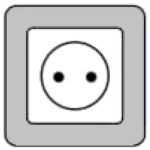
Can North Americans use Electronics in Bulgaria without an Adapter?
No! North Americans will need an adapter for the outlets and a transformer for the voltage when traveling to Bulgaria . North Americans device plugs will not work with the outlet types in Bulgaria . Also, the voltage in Bulgaria is different from North American voltages.
Can Europeans use Electronics in Bulgaria without an adapter?
Yes! Europeans do not need a travel adapter or transformer when traveling to Bulgaria . Most device plugs will work with the outlet types in Bulgaria . Also, the voltage in Bulgaria is the same as in Europe.
What Outlet does Bulgaria Use?
Normal 0 false false false EN-US X-NONE X-NONE
Type C plug sockets are used in Europe, Africa and Asia. They have two round pins and no grounding pin. These plugs are typically used with devices that have a voltage of 220-240V. This outlet is rated for 2.5 amps. Plug Type E, and Type F are compatible with this socket. All other plug types will need an adapter.
Type F electrical plug sockets are used in Germany, Spain, Italy and some parts of Africa . They have two round pins and a grounding pin. These outlets are typically used with devices that have a voltage of 220-240V. This outlet is rated for 16 amps. Plug Type C and Type E are compatible with this socket. All other plug types will need an adapter.
Is it safe to drink water in Bulgaria?
The safety of drinking water in Bulgaria is generally good. According to the World Health Organization (WHO) , more than 99% of the population in Bulgaria has access to improved drinking water sources, which means that the water is from a protected well or spring, or treated through a piped system.
The water treatment system in Bulgaria is modern and meets European Union standards, and the tap water is safe to drink in most urban areas. However, in rural areas, the water quality may not be as good due to poor sanitation and lack of treatment facilities.
Even if the tap water is considered safe to drink in Bulgaria, it is still advisable to take precautions to avoid potential contamination. For example, it is recommended to boil tap water before drinking it or to use a water filter.
Alternatively, bottled water is widely available and is a safe option for drinking in Bulgaria. It is essential to ensure that the seal is intact before consuming the bottled water.
If you are traveling to Bulgaria, it is recommended to consult with a healthcare provider or a travel health specialist for specific recommendations on how to stay healthy and avoid waterborne diseases.
We recommend always packing a filtered water bottle when traveling:
Travel Essentials
Be sure to check our list of travel essentials before your trip!
Recommended Travel Essentials
Should I get travel insurance when traveling to Bulgaria?
It is generally recommended to get travel insurance when traveling to a different country. Travel insurance can provide financial protection and peace of mind in case of unexpected events, such as medical emergencies, trip cancellations, lost or stolen baggage, or other travel-related mishaps.
Travel insurance can cover various expenses related to your trip, such as medical expenses, emergency medical transportation, trip cancellation or interruption, lost or stolen baggage or personal belongings, and other travel-related expenses.
Before purchasing travel insurance, it’s important to carefully review the policy details, including the coverage limits, exclusions, and any applicable deductibles or copays. You should also make sure that the policy covers any activities or destinations that you plan to participate in or visit during your trip.
Travel Summary
The capital city of Sofia is a must-see destination, with a mix of ancient ruins, Ottoman-era mosques, and modern buildings. Visitors can explore the city’s many museums, including the National Museum of History and the National Art Gallery, or take a stroll through the city’s many parks and gardens.
Bulgaria is also known for its picturesque countryside, with mountains, forests, and beaches offering opportunities for hiking, skiing, and sunbathing. The Rila Monastery, a UNESCO World Heritage site, is one of the country’s most iconic landmarks, with its stunning frescoes and mountainous backdrop. Visitors can also explore the Seven Rila Lakes, a group of glacial lakes located high in the Rila Mountains.
The country is also rich in history, with many ancient ruins, castles, and museums showcasing Bulgaria’s past. Some of the most popular sites include the ancient Roman theater in Plovdiv, the Tsarevets Fortress in Veliko Tarnovo, and the Thracian tomb of Kazanlak, a UNESCO World Heritage site.
Bulgaria is a welcoming destination for travelers, with a strong focus on tourism. The country’s official language is Bulgarian, but many people speak English as well. The cuisine is also a highlight, with traditional dishes like banitsa (pastry filled with cheese) and shopska salad (tomato and cucumber salad) reflecting the country’s Balkan and Mediterranean roots.
Overall, Bulgaria offers a unique travel experience for those looking to explore Eastern Europe’s history, culture, and natural beauty. With its friendly locals, diverse attractions, and rich heritage, Bulgaria is well worth a visit.
Traveling to another country? Check out our Countries page for more info.
In Bulgaria, power plugs and sockets (outlets) of type F are used. The standard voltage is 230 V at a frequency of 50 Hz.
- Yes, you need a power plug travel adapter for sockets type F in Bulgaria.
- You also need a voltage converter.
- Be extra careful with certain devices because of the difference in frequency.
Do your power plugs fit in Bulgaria?
In Bulgaria, they use power sockets (outlets) of type F. In the United States, you have plugs A and B. You need a power plug adapter in Bulgaria for sockets type F. The plugs of your electric devices don't fit without.
Buy a power plug (travel) adapter
We don't sell power plug adapters. We refer you to Amazon, where you will find a great selection of travel adapters.
- Find travel adapters at AMAZON.COM
You need to look for a power plug adapter for sockets type F. Alternatively, choose a world travel adapter that fits multiple sockets, in case you travel more often. Because you need a voltage converter as well (see below), you might want to use a combined travel adapter/voltage converter.
Voltage converter needed in Bulgaria?
The standard voltage in Bulgaria (230 V) is much higher than the voltage level your devices typically operate at in the United States (120 V). Without a converter, you risk serious damage to your devices. Additionally, be aware that the frequency in Bulgaria differs.
- You need a voltage converter in Bulgaria to protect your devices!
- Try to find a voltage converter that can also change the frequency.
A voltage converter will ensure a safe input voltage level for your devices in Bulgaria. You can find voltage converters at Amazon. Because you also need a power plug adapter, you might want a combined plug adapter/voltage converter.
- Find voltage converters at AMAZON.COM
- Find combo plug adapters/converters at AMAZON.COM
Be warned if your converter cannot change the frequency. It is not advisable to use your devices. But if you do (at your own risk), exercise special caution with motorized devices and those containing electronic chips, such as clocks, shavers, and medical devices.
To be sure, check the label on your devices. Some devices never need a converter. If the label states 'INPUT: 100-240V, 50/60 Hz' the device can be used in every country in the world. This is common for devices with chargers like tablets/laptops, photo cameras, cell phones, toothbrushes, etc. For these devices you will only need a power plug adapter.
Need anything else?
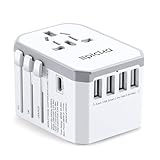
Check out our checklist
Check if you have packed everything for your trip at our TRAVELER'S CHECKLIST !
Frequently asked questions
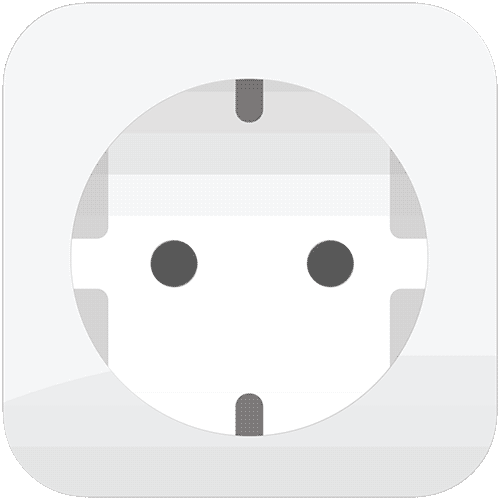

Power Plugs and Outlets in Bulgaria: Do I Need a Travel Adapter?
Last Updated Mar 16, 2024
Just FYI, some of the links here are affiliate links. If you click and buy something, We might earn a small commission.
⚡︎ Get your FREE AMAZON PROMO CODE here: Save 20.0% on select products from TRUNKCRATEPRO Organizer with this Amazon promo code 204819RD , through 04/22 while supplies last.
Are you planning a trip to Bulgaria? If so, you may be wondering about the types of power plugs and outlets in Bulgaria, and whether or not you need a travel adapter for your electrical devices. Here is a quick guide to help you figure out if you need a travel adapter for Bulgaria:
What Power Plugs and Outlets Are Used in Bulgaria?
In Bulgaria, there are two main types of power plugs and outlets: Type C and Type F.
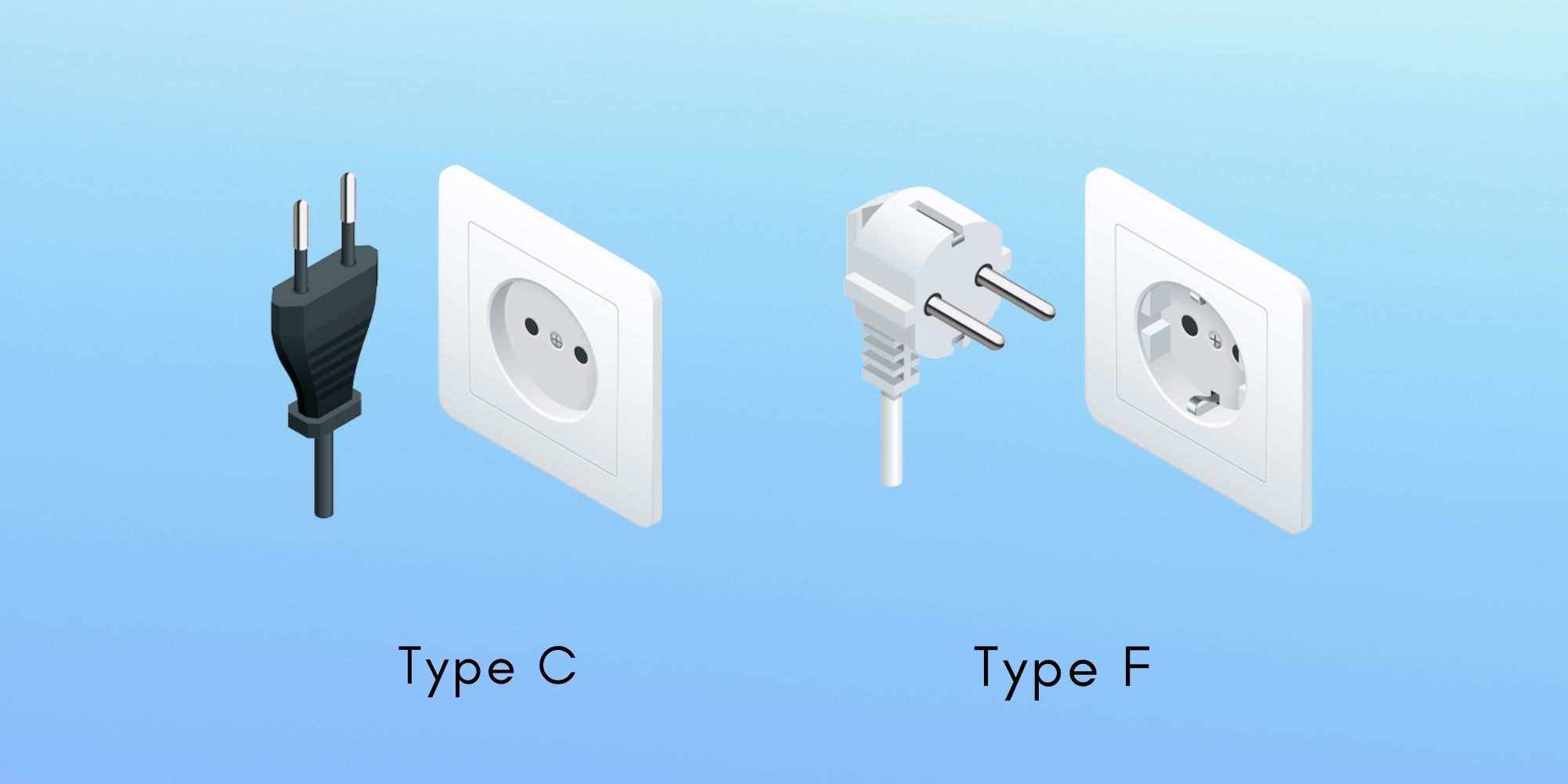
Type C: Type C plugs have two round prongs on either side of the plug, commonly known as Euro plugs. Mostly used in Europe, South America, and Africa. Type C outlets can be fit with either Type E or Type F plugs.
Type F: Type F plugs are slightly thicker than Type C plugs. Type F plugs have two round prongs on either side of the plug, commonly known as Schuko plugs. Mostly used in Europe, Asia, and Africa. Type F outlets can be fit with either Type C or Type E plugs.
If you are traveling to a country with a different type of outlet, you will need to purchase an adapter. The adapter will convert the outlet from one type to another and allow you to fit your plug into it.
There are various types of adapters available on Amazon , including universal adapters that can fit most outlets in the world.
Buy a Travel Adapter for Bulgaria
If you would like to bring your hair dryer , hair straightener , curling iron , or any other electrical appliance with you while traveling to Bulgaria, make sure that it is compatible with Bulgaria outlets. If it is not, you will need to purchase a travel adapter for Bulgaria.
There are many different types of adapters available on Amazon that can be used in Bulgaria. You can purchase a universal adapter that will fit most outlets in the world, or you can purchase a specific adapter for Bulgaria .
→ Find travel adapters on Amazon .

What Voltage and Frequency Are Used in Bulgaria?
In Bulgaria, the standard voltage is 230 V and the frequency of electricity is 50 Hz.
If you’re traveling from another country and your electronic device isn’t compatible with Bulgaria voltage, it may not work properly.
If you’re concerned about how your electronic devices will work in Bulgaria, it’s important to check their voltage and frequency before traveling.
Additionally, you should know that some electronic devices may require a voltage converter or transformer to function properly in Bulgaria.
You can find voltage converters on Amazon , or at your local electronics store.
Buy a Voltage Converter for Bulgaria
If you would like to bring your laptop , tablet , camera , or other electronic devices with you to Bulgaria, it’s important to check their voltage and frequency before traveling. If your electronic device isn’t compatible with Bulgaria voltage, it may not work properly.
If you’re concerned about how your electronic devices will work in Bulgaria, it’s best to buy a voltage converter or transformer before leaving home.
You can purchase one from Amazon, or at any electronics store near your home before you leave for Bulgaria. If you don’t have time to shop around for the best price or if you feel like purchasing your voltage converter from a trusted source (like Amazon), check out the variety of voltage converters on Amazon here:
→ Find voltage converters on Amazon .

Are you looking for more information? Check out the following posts:
13 Best Gifts for Bulgaria Vacation
⚠️ If you don’t have a VPN yet, you can try NordVPN free for 30 days. It is one of the most popular VPNs and is a great option for protecting your privacy and security while you’re traveling.
Plugs in Bulgaria🇧🇬
Heading to Bulgaria for your trip? It’s always smart to check if you need a universal travel adapter or not.
Many countries have different types of outlets and plugs compared to what we use in the United States. We’ve got all the info you need for your trip to Bulgaria.
Do you need a travel adapter?
❗ Yes, you’ll need a travel adapter in Bulgaria.
Key takeways
- 🔌 The outlets in Bulgaria are type C and F .
- ⚡️ The voltage is 230V and the frequency is 50Hz .
- 🌎 You do need a travel adapter for electrical devices from the United States.
- 🔋 You’ll likely need a converter for some devices .
The travel adapter you need
We’ve done the research to find the best travel adapter for your trip. You can find the top-rated travel adapter below. You’ll be redirected to Amazon where you can easily order the adapter.
EPICKA Universal Travel Adapter
Outlets in bulgaria.
Bulgaria, known for its diverse landscapes and rich history, including the ancient city of Plovdiv, uses type C and F outlets. Different from the US, so a travel adapter is a must.
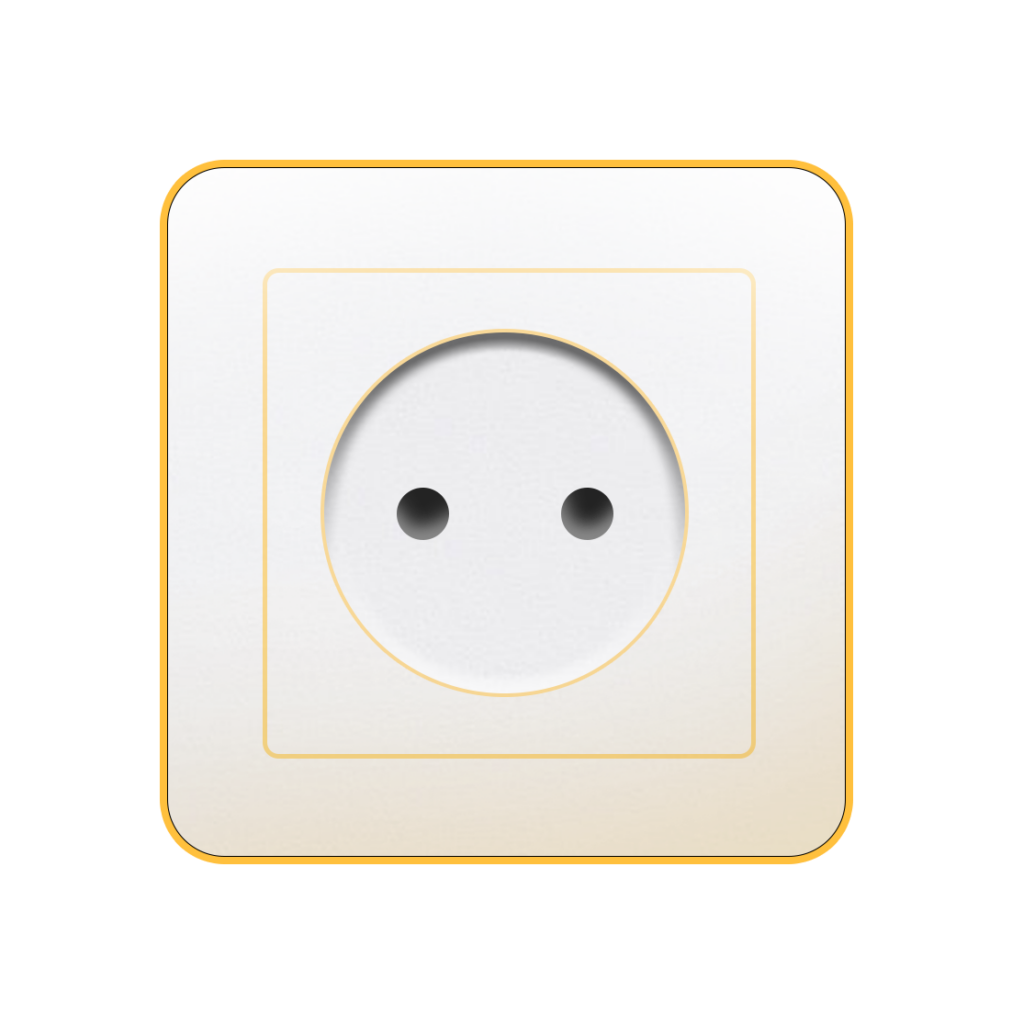
Type C outlets also work with type C and F plugs.
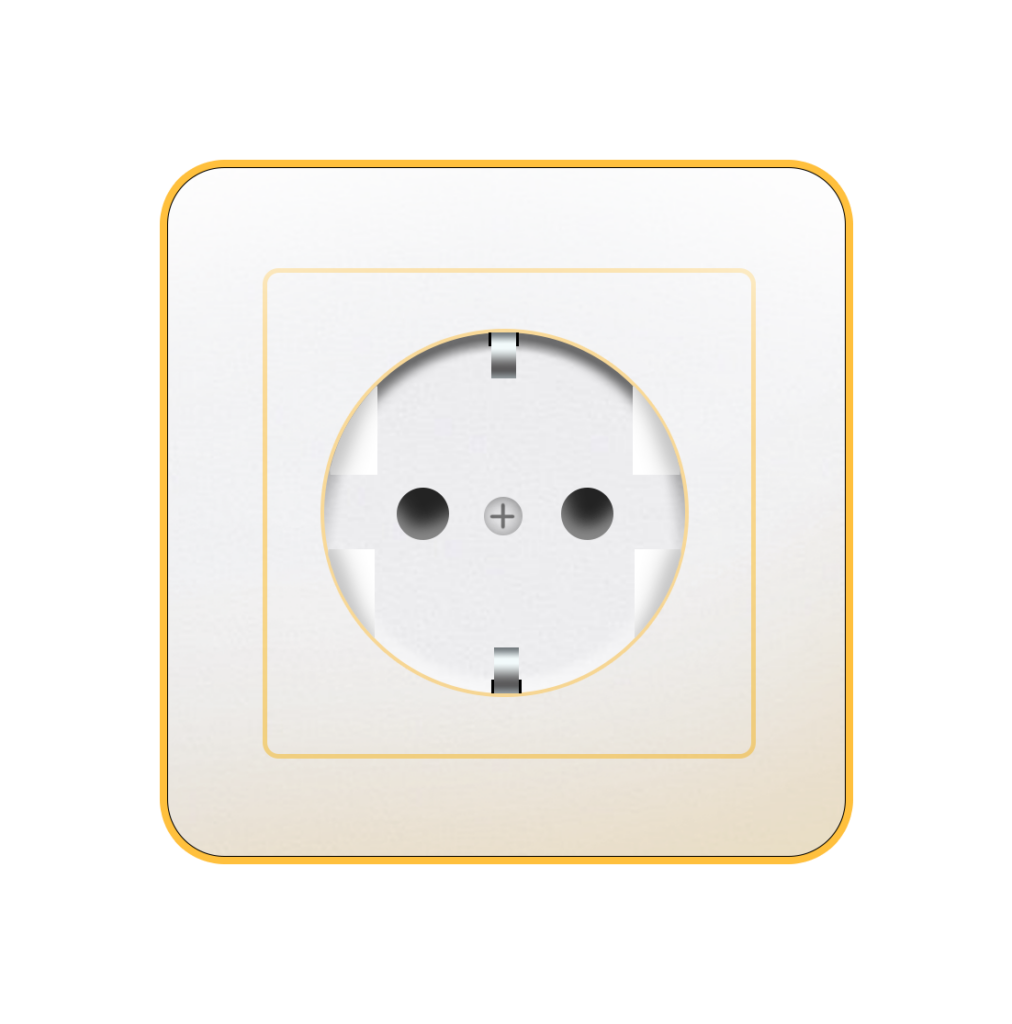
Type F outlets also work with type C and E plugs.
Do you need a voltage converter in Bulgaria?
❗ Yes, you’ll likely need a voltage converter.
In Bulgaria the standard voltage is 230V with a frequency of 50Hz . This doesn’t match the 120V standard in the United States . Therefore, not every device will work with just a travel adapter. Always check if your devices are compatible with different voltages.
A voltage converter is likely necessary for some devices . Always refer to your device’s manual. If it states ‘ INPUT: 100-240V, 50/60 Hz ,’ it’s usually usable worldwide.
Voltage converter 220/240V to 110/120V
With the voltage converter below, you’re all set for American electronics, but always double-check the device you want to hook up to the converter. This product comes highly recommended by users and is definitely a must-have for your trip.
Key Power Voltage Converter
Also of interest for your trip, apple airtag.
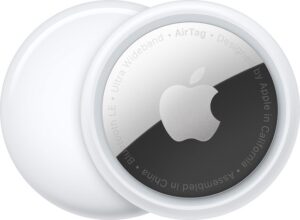
- Always have your suitcase location at your fingertips
- Set up in under a minute
- Precise location tracking
Vacuum Storage Bags

- Hand pump included
- Protect against dirt, moisture, and odors
Packing cubes
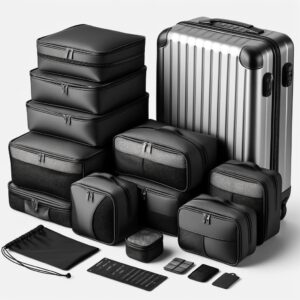
- Organize your suitcase
- Keep your clothes clean
- 20-piece set

Travel Adaptor for Bulgaria
Bulgaria travel adaptors.
You will need to consider what to pack, to ensure you can use your personal electrical appliances safely whilst abroad. This normally includes the use of a travel adaptor , which is a device that simply allows you to plug any UK electrical appliance into a foreign electrical socket. It is important to note that it does not convert the voltage or frequency.
For Bulgaria there are two associated plug types, types C and F. Plug type C is the plug which has two round pins and plug type F is the plug which has two round pins with two earth clips on the side. Bulgaria operates on a 230V supply voltage and 50Hz.
Voltage converters and transformers
Electricity supplies worldwide can vary from anything between 100V and 240V. It can be extremely dangerous to use an electrical appliance that is rated at a voltage different from the supply.
As voltage can differ from country to country, you may need to use a voltage converter or transformer whilst in Bulgaria. If the frequency is different, the normal operation of an electrical appliance may also be affected. For example, a 50Hz clock may run faster on a 60Hz electricity supply. Most voltage converters and transformers come supplied with plug adaptors, so you may not need to buy a separate travel adaptor.
All converters and transformers will have a maximum power rating (AMPS or WATTS) so make sure that any appliance you intend to use does not exceed this rating.
Dual voltage rated appliance
You can determine whether you’ll need to use a converter or transformer, by looking at the appliance rating plate.
A dual voltage rated appliance will display for example ‘INPUT: 110-240V’ on the body of the appliance or its power supply. This means that you will not need a converter or transformer but just a travel adaptor, because Bulgaria operates on a 230V supply voltage, which is within the 110-240V range that the dual voltage appliance operates on.
Single voltage rated appliances
In Bulgaria the supply voltage is 230V. If the appliance or its power supply are not dual voltage rated, the single voltage appliance will have to be used alongside a voltage transformer or converter to allow the appliance to work safely and properly (unless the appliance operates at 230V).
Converters and transformers perform a similar function, but their applications differ. Converters are typically used with appliances that operate for a short duration (1-2hours), whilst most transformers can be used alongside appliances that operate continuously.
It’s important to understand that some travel adaptors are not suitable for any appliances that require an earth connection. These types of travel adaptors should only be used with double insulated equipment, which will be clearly marked with the symbol shown below.
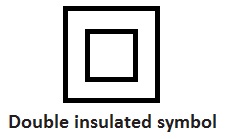
We recommend you check your appliances before embarking on your journey, to understand the requirements in Bulgaria.
Share this article:
Select the country you are from to see if you need a power plug adapter when travelling to Bulgaria.
Bulgaria electrical outlets & plugs
Bulgaria uses power outlets and plugs of types C & F. Take a look at the pictures below to see what these plugs and power sockets look like:
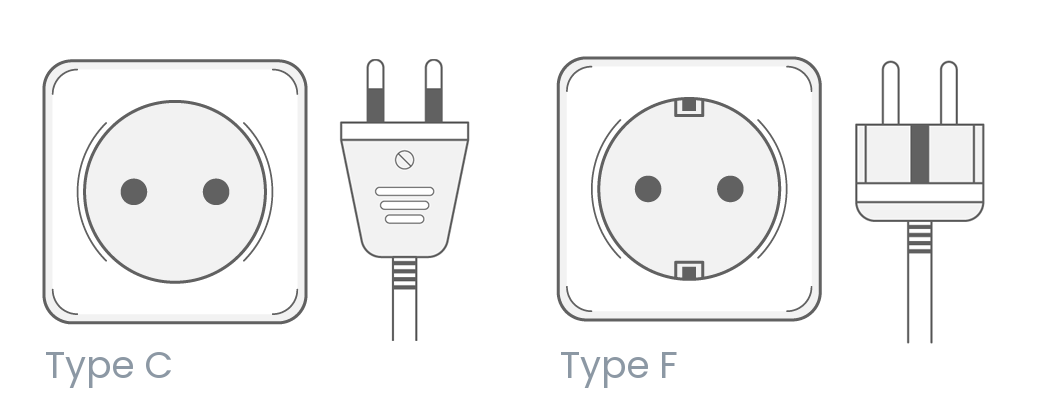
Do the outlets look different in your country? You'll need a power plug adapter.
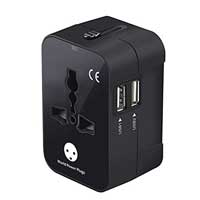
Type C - The standard European plug. Commonly used in Europe, South-America and Asia, but also in quite a few other countries. Plugs of type E and F will also fit in a type C outlet.
Type F - Used in almost all European countries and Russia. Also known as the Schuko plug. Plugs of type C and E will also fit in a type F socket.
Electricity in Bulgaria - voltage and frequency
All power sockets in Bulgaria provide a standard voltage of 230V with a standard frequency of 50Hz.
You can use all your equipment in Bulgaria if the outlet voltage in your own country is between 220V-240V. This is the case in most of Europe, Australia, the United Kingdom and most countries in Africa and Asia.
If the standard voltage in your country is in the range of 100V-127V (which is most common in the US, Canada and countries in South America) you might need a voltage converter in Bulgaria.
The standard frequency in Bulgaria is 50Hz. If this frequency differs from the frequency used in your home country, please use caution when plugging in your devices. Check the small print on the device to see if the device can handle the frequency. Please note we regularly check our electricity information with the International Electrotechnical Committee (IEC)
Small print on the device or power adapter indicates what voltages the device can work with. If you see 100-240V 50/60Hz printed, the adapter is rated to work on all voltages used worldwide. Please note that power plug adapters only convert plug types and do not convert voltages.
Our recommended adapters
Universal adapter
Adapter + Converter
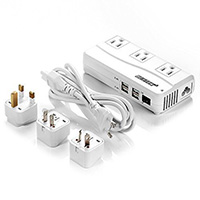
Frequently asked questions
What power plug types and electrical outlets are used in Bulgaria? ⌄
In Bulgaria they use power plugs and electrical outlets of types C & F.
What voltage is used in Bulgaria? ⌄
The standard voltage in Bulgaria is 230V at a frequency of 50Hz.
All countries
- Afghanistan
- Åland Islands
- American Samoa
- American Virgin Islands
- Antigua and Barbuda
- Balearic Islands
- Bosnia and Herzegovina
- British Virgin Islands
- Brunei Darussalam
- Burkina Faso
- Canary Islands
- Cayman Islands
- Central African Republic
- Christmas Island
- Cocos (Keeling) Islands
- Cook Islands
- Czech Republic
- Dominican Republic
- Easter Island
- El Salvador
- Equatorial Guinea
- Falkland Islands
- Faroe Islands
- French Guiana
- French Polynesia
- Galápagos Islands
- Guinea Bissau
- Isle of Man
- Ivory Coast
- Liechtenstein
- Marshall Islands
- Myanmar-Burma
- Netherlands
- Netherlands Antilles
- New Caledonia
- New Zealand
- Norfolk Island
- North Korea
- Northern-Ireland
- Northern Mariana Islands
- Papua New Guinea
- Philippines
- Puerto Rico
- Saint Barthélemy
- Saint Helena, Ascension and Tristan da Cunha
- Saint Kitts and Nevis
- Saint Lucia
- Saint Martin
- Saint Pierre and Miquelon
- Saint Vincent and the Grenadines
- Sao Tome and Principe
- Saudi Arabia
- Sierra Leone
- Sint Eustatius
- Sint Maarten
- Solomon Islands
- South Africa
- South Korea
- South Sudan
- Svalbard and Jan Mayen
- Switzerland
- Trinidad and Tobago
- Turkmenistan
- Turks and Caicos Islands
- United Arab Emirates (UAE)
- United Kingdom
- United States
- Vatican City
- Wallis and Futuna
- Western Sahara
Bulgaria Power Plugs Types & Socket : Travel Adapter Required?
If you are planning a trip to Bulgaria, it’s important to know what types of power plugs are used there.
Bulgaria’s power outlets are different from those in most other countries, so you’ll need to make sure you have the right type of plug. In this article, we will provide you with everything you need to know about power plugs in Bulgaria.
What types of power plugs are used in Bulgaria?
In Bulgaria, there are two kinds of plug types C and F. Plug type C is the plug which has two round pins, while plug type F has two round pins with two earth clips. In Bulgaria, the standard voltage is 230V and the frequency of electricity is 50Hz.
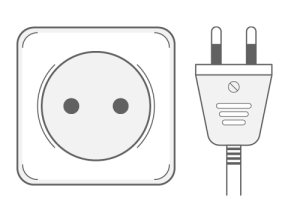
Voltage and Frequency in Bulgaria
If you want to use electrical appliances in Bulgaria, just a friendly reminder to be aware of the specific voltage and frequency systems. This applies to everyone, whether you’re visiting Bulgaria, studying there, or working.
The voltage in Bulgaria is 230V, which is lower than other countries such as the United States (120 volts) and Europe (230 volts).
The frequency in Bulgaria is 50Hz , depending on the region. Some appliances, such as clocks and timers, may not work properly. They can create problems if they are used at the wrong frequency.
This is because manufacturers consider slight deviations in voltage of up to plus or minus 5%.
If the appliance doesn’t work with the local electrical outlets, you need to use an adapter that converts voltage or adapts plugs.
It is important to check the voltage and frequency requirements of each device before bringing them to Bulgaria. If the appliance is not compatible with the local electrical outlet system, you will have to use a voltage converter and/or a plug adapter.
Dual Voltage Rated Appliances
You can determine whether you will need to use a converter or transformer, by checking at the appliance rating plate.
A dual voltage-rated appliance, for example, if your devices have this, written ‘INPUT: 100-240V’ on its exterior or its power supply. You won’t need a converter or transformer, just a travel adaptor because Bulgaria uses a 100V supply voltage, which is the same voltage that the dual voltage appliance uses.
Using Power Plugs in Bulgaria
Using power plugs in Bulgaria is simple, but you have to be careful. Simply insert the plug into the socket and connect your electronic device, like a hair dryer, charger, iron, etc. However, there are a few things to keep in mind:
Make sure your device is rated for 100 volts. Most modern electronics can handle 100v voltage, but it’s always best to double-check.
Be aware that Bulgaria’s power outlets are designed for flat plugs, so if your device has a polarized plug (one prong is wider than the other), you may need an adapter.
Travel Adapters for Bulgaria
There are many different types of power plug adapters for Bulgaria available on the market. Some popular options include:
Universal Travel Adapter: This type of adapter usually includes multiple plug types, including each types of plugs, making it perfect when you are traveling internationally.
Bulgaria’s Adapters: These adapters are specifically designed for use in Bulgaria and also include surge protection to keep your devices safe.
You can also check the map to see the use of different plugs and sockets in the world.
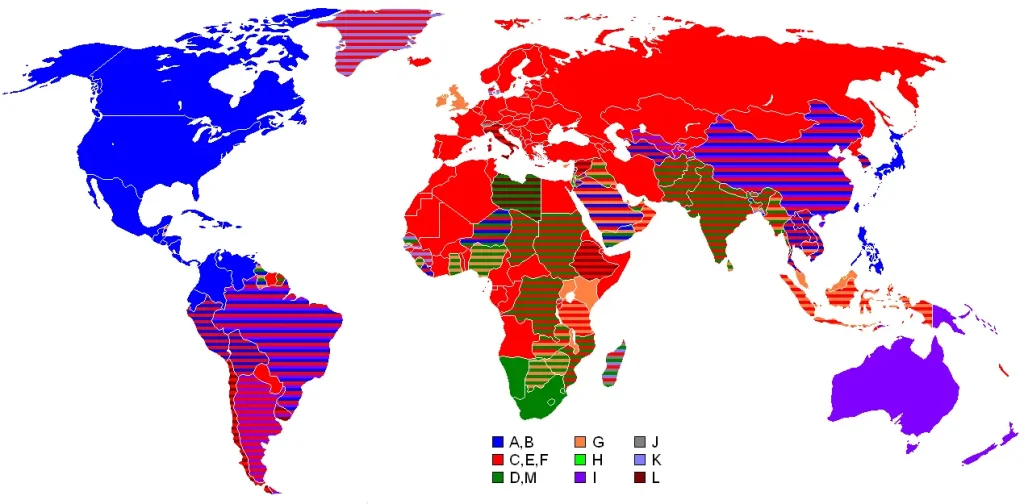
Comparing Different Power Plugs
When comparing power plugs for Bulgaria, here are a few things to consider:
Compatibility: Make sure the plug you choose is compatible with all your electronic devices.
Convenience: Look for a plug that is easy to use and carry with you while traveling.
Safety Features: Consider whether the plug includes any safety features, such as surge protection, overcurrent protection and short circuit protection.
Safety Tips
When traveling to Bulgaria, it is important to keep safety in mind when using electrical devices. Here are some tips to help you stay safe:
Check your device’s compatibility.
Before plugging in any device, make sure it is compatible with Bulgaria’s electrical system. Bulgaria uses a voltage of 230V and a frequency of 50Hz, which is different from many other countries. If your device is not compatible, you may need to use a voltage converter or transformer to avoid damaging your device.
Use the Correct Plug
Bulgaria uses Type C and Type F plugs, which are different from the plugs used in many other countries. Make sure you have the correct plug for your device before plugging it in. If your device has a grounding pin, you will need an adapter to use a Bulgaria outlet.
Avoid Overloading Outlets
Be careful not to overload electrical outlets in Bulgaria. Overloading can cause a fire or damage to your device. If you need to plug in multiple devices, use a power strip with surge protection.
Keep water away from electrical devices.
Water and electricity do not mix. Keep water away from electrical devices, and do not use electrical devices near water. If a device gets wet, unplug it immediately and let it dry completely before using it again.
Be Careful with Portable Chargers
Portable chargers can be a convenient way to keep your devices charged on the go, but they can also be dangerous if not used correctly.
Make sure your portable charger is compatible with your device and use it according to the manufacturer’s instructions.Do not leave your portable charger plugged in for extended periods of time, and do not use it near water.
By following these safety tips, you can help ensure a safe and enjoyable trip to Bulgaria.
What type of power outlets are used in Bulgaria?
Bulgaria uses two types of power outlets: Type C and Type F.
Can I use my U.S. power plug in Bulgaria?
No, you cannot use a U.S. power plug in Bulgaria. You will need an adapter that is compatible with Local power outlets.
Do I need a voltage converter for Bulgaria?
If your electronic devices are rated for 100 volts, you do not need a voltage converter.
Can I charge my laptop in Bulgaria?
Yes, you can charge your laptop in Bulgaria, as long as you have the right type of power plug or adapter.
Where can I buy power plugs for Bulgaria?
You can buy power plugs for Bulgaria at most electronics stores or online retailers.
You don’t have to be a genius to use power plugs in Bulgaria. You just need some common sense. If you choose the proper plug or adapter and follow the described steps, your electronic devices will stay charged while you’re traveling. Make sure you bring a power adapter before you go on your Bulgaria’s adventure!
If you have any queries and questions, you can ask in the comment section of this page.
Bulgaria Other Related Information
- Bulgaria Popular States: Sofia, Plovdiv, Varna, Burgas, Ruse
- Bulgaria Area (SQ Km): 110,879.00
- Bulgaria Capital: Sofia
- Bulgaria Population: 6,948,445.00
- Bulgaria Spoken Language: Bulgarian
- Bulgaria Currency: Bulgarian Lev
Leave a Comment Cancel reply
Save my name, email, and website in this browser for the next time I comment.
Power Plug & Socket
Bulgaria plug & power outlet: travel adapter needed.
Traveling to Bulgaria? It is important to determine if you need a travel adapter or a voltage converter for Bulgaria plug and power outlets.
Not to worry, we have all the information you need to ensure a problem-free trip.
What type of plug is used in Bulgaria power outlet?
The plug and power outlets used in Bulgaria are the types C and F plugs.
Type C plug has two round pins, while the type F plug has two round pins, with two earth clips on the side.

What is the voltage and frequency in Bulgaria?
The standard voltage in Bulgaria is 230 V, while the standard frequency is 50 Hz.
For travelers from countries with a standard frequency between 220 – 240 V, such as Australia, Europe, the UK, and countries in Africa and some parts of Asia, electric appliances can be used in Bulgaria without a voltage converter.
This is because manufacturers take into account slight deviations.
Travelers from countries with a standard voltage between 100 – 127 V, such as Canada, the US, countries in South America, will require a voltage converter to use appliances in Bulgaria.
If your country’s standard frequency is different from that of Bulgaria, it is best that you do use your appliance in Bulgaria.
Some devices can be used in all parts of them because they cover a wide range of frequencies and voltage.
On the label of such devices, an inscription such as “INPUT: 100 – 240 V; 50 – 60 Hz” is clearly written.
Such devices include chargers of cell phones, tablets, phone cameras, laptops, and electric toothbrushes.
Want to buy a power plug/travel adapter or voltage converter?
The list of travel adapter products and converters available online is endless. However, when you choose a quality travel adapter, you can stay connected to a power source.
Fortunately, here’s our top-3 travel adapter picks from Amazon, in terms of quality, design, and price.

- Find more travel adapters/converters combo on Amazon
- Find more voltage converters on Amazon
Electricity in Bulgaria: How does Bulgaria get its energy?
Bulgaria produces its electricity from a combination of nuclear energy, thermal power plants, thermal power plants, and renewable sources.
Of its installed electrical capacity , nuclear energy produced in the Kozloduy Nuclear Power Plant accounts for 16%, hydropower 25%, renewable sources 14%, gas thermal power plant 6%, hard coal thermal power plant 6%, and lignite thermal power plant 26%,

Bulgaria Power plug socket adapter travel
When you thinking to travel to another country, you need to be caution when using your electric appliances, because there are a different plug types and sockets in the worldwide. For that we will help you to discover all the different Bulgaria’s power plug socket types and some information about the voltage and the travel adapter in Bulgaria.
Electrical Voltage plug frequency in The Bulgaria:
- The Bulgaria standard voltage is : 230 V
- Bulgaria standard frequency : 50HZ
- The Bulgaria power Plug Type : F
Type of plugs sockets in Bulgaria:
The power plugs and sockets in Bulgaria are of type F. Check out the following pictures:
Type F: This plug type is also known as Schuko. The plug type C and plug E can fit the plug socket F.

But if you are from the United States of America you will need a power plug adapter for sockets type F. Your equipments with the plug A will not fit socket F.
Your equipment with the plug B will not fit socket F.
The voltage and frequency in Bulgaria:
The standard voltage in Bulgaria is 230 V and the standard frequency is 50 Hz. So you can use your electric appliances in Bulgaria, if the standard voltage in your country is in between 220 V- 240 V which is common in the United Kingdom, Europe, Australia and most of Asia and Africa.
But you will not use your electric equipments in Bulgaria without a voltage converter, because the standard voltage in Bulgaria (230 V) is higher than the voltage which used in the United States of America (120 V). And if the frequency in Bulgaria (50 Hz) is differs from the one in your country, it is not advised to use your equipments. But if there is no voltage difference, you could try to use the appliance for a short time at your own risk.
The travel adapter in Bulgaria:
The power adapter for Bulgaria is a small and cheap plastic adapter which permits a Bulgarian power outlet to Work with a different type of power plug from an appliance from another region. And the best power adapter for Bulgaria will be a Type F plug adapter which allows you to use any 230 volt appliance or device.
If you are traveling from the United States of America to Bulgaria:
- The voltage is equal to the 230 volts in the United Kingdom. So this means that you can use all your electrical appliances without any problems
- The frequency is the same as in the United Kingdom. And that’s why it is safe to use all your electric appliances in Bulgaria.
- You might need a power plug adapter in Bulgaria, when living in the United States of America. Because the people in Bulgaria are using different plugs and plug sockets that are not compatible with plugs from the United Kingdom !
- You will also need a voltage converter.
- You need to be more careful with certain appliances because of the difference in frequency
Leave a Comment Cancel reply
Privacy overview.
- Search Search Search …
- Search Search …

Plug Adapter for Bulgaria – [Power Adapter for Bulgaria]
Traveling in Bulgaria is easy when it comes to charging devices, as the country uses the most common plug type that is used across the continent of Europe. However, you’ll need to know what converter or adapter you need for Bulgaria to ensure that your electric devices can be charged while you’re here. One of the top considerations we have when traveling is to ensure that we can charge our devices. (and we have a lot!), and that it’s going to be safe to charge them too. So here’s all you need to know about Bulgaria power adapters. I’ll cover the plug adapters for Bulgaria, whether you need an adapter for Bulgaria and Bulgarian electric adapter requirements too.
THIS POST MAY CONTAIN COMPENSATED AND AFFILIATE LINKS MORE INFORMATION IN OUR DISCLAIMER
TOP PRODUCT PICK
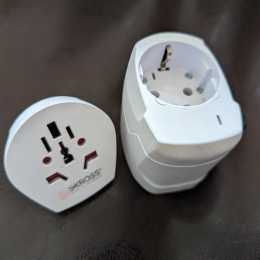
Best Travel Adapter
This fabulous adapter will cover you no matter where you’re from. And it’ll cover you wherever you’re going to.
Electricity supply around the world is different, with voltages ranging from 100 volts to 240 volts, and devices and appliances are rated at different voltage levels (there’s always a label that says what they are if you have a relatively recent product). Add to that the fact that electric sockets and plugs are also different around the world. Our hometown these days is Bansko , Bulgaria, but many of our devices are from the UK, so this is really important to us!
There’s no need to try and describe the plug or socket, there is an international naming convention, with plugs and sockets named using letters of the alphabet, from A to N. Although if you want to describe it, it’s the “two fat round prongs” plug. And the two round holes socket.
What’s the Electricity Supply like in Bulgaria?
In Bulgaria, the electricity supply is 230 volts. That’s standard across Europe.
The voltage in Bulgaria is different from North America, which is 120 volts. Bulgaria’s voltage is the same as the rest of Central Europe, which is 230 volts. The United Kingdom operates at 230 volts. Australia operates at 220 -240 volts. New Zealand operates at 230-240 volts.
This SK Ross travel adapter supports Bulgaria and another 204 countries. This fabulous world piece of kit covers you regardless of the plug type you’re using and whatever socket you need to plug into. It does NOT however convert the voltage.
Voltage converters are heavy and expensive and you really shouldn’t be taking them on holiday. If your device is rated for a different voltage than that of Bulgaria, then it’s only usually an issue with something like a hairdryer (and your hotel will generally have one of those).
You will be able to tell whether you need a voltage converter or a transformer by looking at the information noticed on your device. It’s like to say something like “INPUT: 110-240V”. So Bulgaria, at 230 Voltas is within this range. So you will just need a travel adapter for Bulgaria.
The Bulgaria Electrical Standards
- Electric socket type C or F (see the photos)
- Electric plug type C or E
- Voltage 230 volts
- Frequency 50Hz
In Bulgaria, we use Type C and Type F sockets and plugs.
The Type C plug is the most commonly used plug and socket across Europe. It’s got two round prongs. The difference between a Type C and a Type F plug is that the Type F plug has two earth clips on the side. You can see this in the photos.
What does it mean that the voltage is different in Bulgaria from my home?
All electric devices are rated to be used for specific voltages. But they’re usually actually rated for a range, like, “Voltage 100 volts to 240 volts”. You should find this on a label on your devices.
What this means is that if the usable voltage range on your device is different from where you’ll be plugging it in, then you usually need to use a converter to safely use it. The main issue with voltage is with heating devices, such as hair dryers, curling irons, and hair irons.
If you’re concerned, then you can check the label on it, which will indicate a published safe operating limit.

What types of plugs are used in Bulgaria?
Two different types of plugs are used in Bulgaria. Type C and Type F. They look very similar. And we come across both types C and F and both types of sockets here in Bulgaria. However, most of our devices were bought in the UK. And our SK Ross adapter has been invaluable.
Plug Type C has two round pins. A Type C plug looks like this and a Type C socket looks like this.
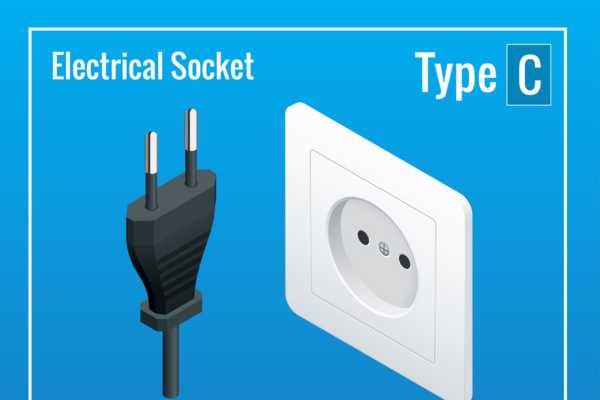
Plug Type F has two round pins. It also has earthing clips on the side. A Type F plug looks like this and a Type F socket looks like this. We have Type F sockets in our apartment in Bansko.

You can also use a Type E plug in either a Type C or Type F socket. Here’s what a Type E plug looks like. You won’t find a Type E socket in Bulgaria, (they’re mainly used in France, Belgium, and Slovakia) but the plug will work here.

What types of sockets are used in Bulgaria?
You will both of these types of sockets in Bulgaria for electricity. You can use Type C, Type E, and Type F plugs in these sockets.
Does Bulgaria use the same plug as the USA?
No. Bulgarian sockets and plugs are different from those in the USA. Unless you have an adapter your American devices will NOT fit in a Bulgarian electric socket.
Do you need a voltage converter in Bulgaria?
Probably not. Most devices that we use daily are dual voltage rated – from between 110-240 voltages but always check the appliance label. If you’re anything like us, then you’re probably traveling with a phone, a camera, an eBook, or perhaps a laptop and you’ll simply use a plug adapter .
What type of plugs are needed in Bulgaria?
You’ll find several types of sockets (and plugs) in Bulgaria. You will find a mix of plug types C, and F and you can also use a Type E plug here.
What is the recommended plug adapter for Bulgaria?
A recommended power adapter for Bulgaria will ensure that your plug then fits into the sockets in Bulgaria. We’ve used SK Ross devices around the world for more than 10 years now, and this power adapter has covered us in all the 110 countries, that we’ve traveled to, including Bulgaria .

Read our guides to what plug adapters you’ll need when traveling
- Bulgarian Plug Adapters
- Power Adapters needed in Italy
- Plug Adapters in the Maldives
- Costa Rica Plug Adapter
- Plug Adapter for Japan
- Tunisia Power Adapter
- Saudi Arabia Power Adapter
- Colombia Plug Adapter
- Sweden Travel Adapter and Plug Guide
- Sri Lanka Plug Adapter
Bulgaria Trip Planning Essentials
- Get great value, and easy travel insurance for Bulgaria with Civitatis
- Get online immediately with an eSIM
- Install a VPN BEFORE you travel to Bulgaria > discount coupon here
- Arrange your airport transfer in Bulgaria with Welcome Pickups.
- Make sure you can charge your electronics – here’s our guide to plug adapters in Bulgaria
- Visit Rila Monastery + Boyana Church
- Explore Veliko Tarnovo – Bulgaria’s Original Capital City
- Go wine tasting in Melnik – Bulgaria’s wine capital
- Take a FREE Walking Tour in Sofia
- Explore Buzludzha aka the UFO Monument
- Spend a day in GORGEOUS Plovdiv
- Book Buses + Transfers in Bulgaria with Bookaway
- Rent a Car in Bulgaria with Discover Cars
- Find the right accommodation for you via Booking.com
Final Words on Plug Adapters for Bulgaria
If you’re coming from Central Europe, then electricity is easy here in Bulgaria, your plugs will work, and the sockets are the same as at home. If you’re traveling to Bulgaria from the USA or the UK then you’ll need a Bulgarian plug adapter, simply so that your plug fits into the socket. You may be able to find an adapter in Bulgaria, but it’s highly unlikely, it’s best to bring one from home.
Stock images in this article are courtesy Deposit Photos.
We receive a fee when you get a quote from World Nomads using our affiliate links. We do not represent World Nomads. This is not a recommendation to buy travel insurance.
ASocialNomad is a participant in the Amazon Services LLC Associates Program, an affiliate advertising program designed to provide a means for sites to earn advertising fees by advertising and linking to amazon.com, amazon.co.uk, and amazon.ca. Amazon and the Amazon logo are trademarks of Amazon.com, Inc. or its affiliates. As an Amazon Associate, I earn from qualifying purchases .
Sarah Carter
Privacy overview.
- London Hotels
- Travel Plug Type Adapters
- Best Duffel Bags
- Luggage Sets
- Travel Kettles
- Travel Pillows
- Travel Accessories
- Travel Bags
- Luggage Scales
- Australia and Surrounds
- Central America
- North America
- South America

The Type of Electrical Plug Used in Bulgaria
When travelling to a new country, it’s always important to be aware of the type of electrical plug that is used. In Bulgaria, the type of plug that is used is known as a C-type plug. This type of plug has two round prongs and is compatible with sockets that are rated at 220-240 volts
If you’re planning on travelling to Bulgaria, it’s important to note that you will need to use a converter or adapter in order to use your electrical appliances. Luckily, we’ve put together a list of everything you need to know about using a converter or adapter when travelling to Bulgaria
Featured Product

- Adapter Plug UK to Bulgaria plug type
- Bulgaria Plug Type
Bulgaria is renowned for its diverse and unique culture , and its electrical outlets are no exception. Outlets in Bulgaria usually feature two round prongs and are generally compatible with outlets in other countries in the European Union. It is, however, important to note that not all outlets in Bulgaria are the same. Depending on the age of the building and the region, outlets may vary in size and shape.
Electricity is a vital part of everyday life, and knowing the type of plug you need is essential. Luckily, it is easy to find out what type of plug you may need while traveling in Bulgaria. Locals are usually willing to help out, and there are also plenty of resources online that will guide you in finding the correct plug type for your specific needs.
Overview of the Bulgarian Plug Types
Bulgaria is home to a variety of plug types , each with its own specific shape and features. Different devices may require adapters to be used in order to be properly connected to the power sources. It is also important to note the voltage and current available in Bulgaria, which can differ from other countries.
- Different Types of Plugs Used in Bulgaria
Continuing on from the previous section, let’s now take a look at the different types of plugs used in Bulgaria. Bulgaria primarily uses Type F sockets and plugs, which are two-prong, round-pin plugs. Unlike Type C plugs, which have two round pins of equal size, Type F plugs have one large round pin and one small round pin, designed to fit into the socket in a particular way. The large pin is grounded , providing a safe flow of electricity to the appliance.
Type F plugs are compatible with Type C sockets, but will need an adapter to fit properly. This means that any devices with a Type C plug can be used in Bulgaria, as long as the appropriate adapter is used. However, it is important to note that the voltage and current in Bulgaria is 230V, 50Hz , and most devices are designed to run on 220-240V. Therefore, it is essential to check the voltage of the device before plugging it into any wall sockets.
Overall, Bulgaria primarily uses Type F sockets and plugs. While Type C plugs are also compatible, they need an adapter in order to fit the socket correctly. Additionally, it is important to check the voltage of the device before plugging it into any wall sockets, as it must be compatible with Bulgaria’s voltage of 230V, 50Hz .
- Adapters Needed for Different Devices
Moving on from the overview, let’s take a closer look at the adapters needed for different devices in Bulgaria. There are a variety of plug types in Bulgaria, so visitors should be prepared for any situation. The two most common plugs found throughout Bulgaria are the Type C and the Type F plugs. The Type C plugs are two round prongs and the Type F plugs are two round prongs with a center grounding pin. It is recommended to bring along an adapter for these plugs, as they are not compatible with the majority of plugs found outside of Bulgaria.
In addition to the common Type C and Type F plugs, there are some other plug types that are found in Bulgaria. These include the Type G plug, which is a three rectangular prong plug, and the Type E plug, which is two round prongs with a center grounding pin, similar to the Type F plug. If visitors are planning to use devices with any of these plug types, they should be sure to bring along the correct adapter.
For those travelling to Bulgaria with devices that require higher voltage, such as hair dryers or electric razors, they should check the voltage and power requirements of their device before travelling. The voltage in Bulgaria is 220V/50Hz, so devices with a maximum power of 2000W will work. However, if the device requires more than 2000W, an adapter and power converter should be used for safety.
- Voltage and Current in Bulgaria
The electricity network in Bulgaria is regulated by the state-owned Electricity System Operator . It operates at a standard voltage of 230 V and a frequency of 50 Hz . As such, all devices and appliances in Bulgaria are designed to operate with this voltage and frequency. This means that different types of plugs and adapters are necessary to use devices from other countries in Bulgaria. As a result, it’s important to consider the type of plugs and adapters you’ll need when traveling to Bulgaria.
Type E Plugs
Type E Plugs provide a unique and convenient way to power devices and appliances. They feature two round prongs, have a bold green grounding pin , and provide a safe and reliable connection. These plugs are used in France, Poland, and other countries across Europe, and require an adapter to work with outlets in other countries.
- Features of Type E Plugs
Moving on from the overview of the various plug types in Bulgaria, Type E Plugs deserve a closer look. These plugs are among the most commonly used in the country, and have some distinct features that make them stand out.
Type E plugs have two round 4.8mm pins, arranged in a vertical line. They also have an additional grounding pin on the side, which is what makes them different from other plug types. This grounding pin is boldly designed, with a wide head that makes it easier to insert into the socket. Furthermore, the pins of a Type E plug are fortified by a plastic casing, which adds an extra layer of safety.
Type E plugs are by far the most commonly used plug type in Bulgaria, and can be found in homes, businesses, and public buildings. Additionally, they are also used in most public outlets, which makes them the plug type of choice for travelers.
- Where Type E Plugs Are Used
Moving on from the features of Type E plugs, let’s explore where these plugs are used. Type E plugs are a special kind of plug used exclusively in France, Monaco, and various African and Middle Eastern countries. They are found in homes, offices, and even outdoors.
Type E plugs are easily identified by their two round pins that are 4.8 mm in diameter and measure 19 mm apart from each other. This plug is typically used for appliances with a rated voltage of 230 V and a rated current of 16 A. It is commonly used for connecting electric lamps, heaters, and computers.
Due to the fact that Type E plugs are quite specific, they are rarely found outside of the countries mentioned above. If you are travelling to a country that uses Type E plugs, you will need an adapter to connect your devices. These adapters can be found easily online and in many large retail stores.
- Adapters Needed for Type E Plugs
Having explored the features of Type E plugs, as well as where they are commonly used, it is also important to understand what kind of adapter may be needed to use a Type E plug. Often , a Type E plug will require an adapter to function correctly in a region that uses a different type of plug. These adapters are easy to obtain, as they are widely available in hardware stores, airports, and online shops.
The adapter itself is typically a simple device, featuring two or three prongs that fit into the wall outlet and a protruding plug that is compatible with the Type E plug. The adapter is often made from durable plastic or metal, and equipped with an on/off switch to ensure safety when in use.
In certain cases, a Type E plug may also be used as an adapter for other plug types. It is important to note that, while this is possible, it is not recommended practice as it may cause damage to the wall socket or plug. Therefore, it is generally best to use a dedicated adapter when working with Type E plugs.
Type F Plugs
Type F Plugs are identified by their horseshoe-shaped pins and sockets, making them distinct from other types of plugs. The horseshoe-shaped pins on Type F plugs are designed to fit into an outlet that has two round pins and an earthed contact in the center. These plugs are used in many countries in Europe and are designed for a variety of purposes.
The features of Type F plugs include a spring-loaded shutter mechanism that prevents electric shocks and a polarized socket that ensures that the plug is inserted correctly. Type F Plugs are also capable of handling higher voltages, making them a popular choice for electronic devices.
Type F Plugs are often used in households for appliances such as air conditioners, washing machines, and refrigerators. They are also used in industrial settings for welding equipment, motors, and other large appliances. In some cases, an adapter may be needed to connect Type F plugs to outlets in other countries.
- Features of Type F Plugs
Now let’s move on to Type F plugs! These plugs are easily recognizable by their two round pins connected by a circular earth pin in the middle. The pins are slightly smaller than Type E plugs, and the earth pin is more prominent. Type F plugs come in two varieties: the CEE 7/4 plug which is ungrounded, and the CEE 7/5 plug which is grounded . Additionally, the pins are slightly angled to ensure a secure fit when plugged in. This plug is used mainly in Germany, Austria, the Netherlands, Scandinavia, Eastern Europe, and parts of Russia.
- Where Type F Plugs Are Used
Following the introduction of Type E plugs, we take a look at its close cousin, the Type F plug. Type F plugs are found mainly in Germany, Austria, the Netherlands, Spain, Sweden, Norway, Finland, and Eastern Europe. They are three-pin plugs, round in shape and often feature a round grounding pin.
In Germany , Type F plugs are quite commonly used and can be seen in many households, offices, and other places. These plugs are designed to fit into wall outlets that have a round center slot and two side slots. They are also designed to be compatible with the German standard for socket outlets.
In Austria , these plugs are also quite commonly used in households and other places. While the plugs might look similar to Type E plugs, it is important to pay attention to the details as the two are incompatible. The Type F plug is designed to fit into outlets that have a round center slot and two side slots.
In the Netherlands , Type F plugs are used in both residential and commercial spaces. The plug is designed to fit into outlets that have two side slots and a round center slot. Adapters for Type F plugs can be purchased if needed.
- Adapters Needed for Type F Plugs
Moving on from Type E Plugs, Type F Plugs are the more robust and reliable alternative when it comes to European-style plugs. But using them requires a few extra steps. In order to use Type F Plugs, one needs adapters .
But don’t worry, these adapters are widely available and can be found in most hardware stores or even online. Adapters for Type F Plugs come in two parts, one for the plug and one for the socket. There are also universal adapters that can be used with both Type E and Type F plugs.
Adapters for Type F Plugs usually have three round prongs, with a separate grounding pin. This grounding pin is longer than the other two and is used to provide a secure ground connection.
The Type F adapter is also compatible with other plug types, such as the Type C plug, with the addition of the appropriate converter. This means that when travelling abroad, it’s easy to stay connected to all European plug standards.
Type C Plugs
Type C Plugs are known for their unique shape , which allows them to fit into particular types of sockets. They are also known for their durability , making them ideal for use in many different countries. Additionally, Type C Plugs are known for their versatility in the areas of where they can be used, as well as the adapters needed to use them.
- Features of Type C Plugs
Trading one type of plug for another, Type C plugs are the newer version of international plugs and have several features that make them stand out. Characterized by a flat, two-pronged plug, they have become popular among travelers who are looking for a universal solution to their charging needs.
The main feature of Type C plugs is their size . These plugs are much slimmer and smaller than other types of international plugs. This makes them easier to store and transport, as they don’t take up a lot of space. In addition, Type C plugs are typically lighter in weight than other international plugs, making them the perfect choice for travelers who are always on the go.
Another feature is the design . The two-pronged design of Type C plugs allows users to easily insert the plug into outlets. This design also helps to secure the plug and prevents it from becoming loose or slipping out. This makes Type C plugs a safer option for travelers. Additionally, the design of Type C plugs provides space for charging two devices at once.
- Where Type C Plugs Are Used
In contrast to Type F plugs, Type C plugs are primarily used in Europe and many other parts of the world. These plugs have a rounded shape, with two flat pins at the bottom that are spaced 19mm apart. This type of plug is mainly used in countries that follow the European Union’s regulations on electrical safety. Type C plugs are also used in countries outside of the European Union that have adopted their regulations.
Type C plugs are popular in countries like North and South Africa, the Middle East, Asia, and South America. The plugs are commonly used in small appliances like laptop chargers, shavers, and battery chargers. In addition, Type C plugs are often used in connection with electrical tools, such as drills and saws.
Type C plugs are also used to power large appliances like refrigerators, washing machines, and televisions. In some cases, Type C plugs may also be used to power electric stoves and ovens. Adapters are needed when using Type C plugs in countries that do not follow the European Union’s regulations. Adapters are also needed when using Type C plugs in countries that have adopted the regulations, but have different outlet types.
- Adapters Needed for Type C Plugs
Moving on from the Type F plugs, let’s take a look at Type C plugs. Adapters needed for Type C plugs is an important topic of discussion when talking about them.
Type C plugs are much smaller than Type F plugs and are usually used in most portable electronic devices. They are designed with a rectangular shape and two round prongs. As a result, these plugs are also known as Europlugs. When using Type C plugs, it is important to use the right adapter, as they are not universally compatible with all outlets.
The adapter for Type C plugs is also rectangular, with two round prongs. Its shape can vary slightly, depending on the country in which it is being used. For example, in Germany, the adapter has an additional pin in the middle for grounding. On the other hand, in France, the adapter is slightly longer and has a rounded edge.
Type C adapters are also interchangeable with Type F adapters. This means that if an outlet is designed for a Type F plug, it can accept a Type C plug with the use of an adapter. Additionally, if an outlet is designed for a Type C plug, it can also accept a Type F plug with the use of an adapter. This makes it easy to use Type C plugs in a variety of countries, as long as the right adapter is used.
In conclusion, adapters are needed for Type C plugs, as they are not universally compatible with all outlets. The shape of the adapter may vary depending on the country, but Type C adapters and Type F adapters are interchangeable. This makes it possible to use Type C plugs in a variety of countries, as long as the right adapter is used.
Type L Plugs
Type L plugs are renowned for their rugged construction , providing a reliable connection for a range of applications. These plugs feature two round pins, arranged in a V-shape , with the grounding pin located between them. They are also commonly used in 230-volt applications , such as heavy-duty industrial and commercial applications. When using Type L plugs, adapters are often necessary to connect them to other outlets.
- Features of Type L Plugs
The Type L plug sets itself apart from the Type C with its unique three-pronged design. This type of plug is most commonly used in Italy and features an insulated grounding pin at the bottom of the plug. The grounding pin is slightly longer than the other two prongs, which are both the power pins. The two power pins are both the same length and are almost always equal in size and shape.
The two power pins are angled in the same direction and are designed to fit securely and safely into the wall socket. This design helps to ensure that the electricity is not only safe and secure, but also that it is distributed evenly throughout the appliance. The Type L plug can also be identified by its bright yellow and black plastic casing, which is designed to protect the plug from dust and moisture.
The Type L plug is designed to be used in a variety of different appliances, including refrigerators, washing machines, and other large appliances. This type of plug is also commonly used in Italy as well as other European countries. Additionally, the Type L plug is one of the few plugs that can be used with an adapter in order to fit into outlets in other countries. This makes it a great option for travelers who need to plug in their devices in multiple countries.
- Where Type L Plugs Are Used
Moving from Type C plugs to Type L plugs, one can see the distinct differences between the two. Type L plugs are the most common plugs used in Italy and Chile. They are also found in some parts of Africa and the Middle East. With two round prongs, they are designed to fit into a round receptacle and are often used in higher voltage applications.
The plug Type L is often used for appliances that require a higher voltage, such as ovens, washing machines, and air conditioners. They are also found in industrial and commercial applications such as in factories and offices. It is important to note that these plugs are not compatible with outlets designed for other types of plugs, so an adapter will be necessary if you are traveling in these countries. Adapters are readily available in hardware stores and online.
The plug Type L is also commonly used for devices that require higher voltage standards, such as medical equipment, lab equipment, and computers. It is important to pay attention to the voltage requirement of your device when determining if you will need a Type L plug or not. Additionally, the round prongs should fit securely into the outlet, so it is important to ensure that the plug fits the socket properly.
- Adapters Needed for Type L Plugs
Moving on from Type C plugs, let’s take a look at Type L plugs. Adapters are sometimes needed for Type L plugs, as they have a unique shape and size that is not compatible with some outlets. For example, Type L plugs are commonly used in Italy, Switzerland, and Chile, and require an adapter for use in different countries.
Generally, adapters for Type L plugs are cylindrical and contain two round pins at one end, which fit into the socket. At the other end, the adapter has an opening that can accommodate a Type L plug. These adapters are also useful because they allow for the use of two-pin devices, such as electric razors, in outlets designed for three-pin plugs.
It is important to use the right type of adapter for Type L plugs, as using the wrong kind can cause serious damage or even cause a fire. It is also important to ensure that Type L plugs are compatible with the outlets in the area of use. Ultimately, it is best to check with a local supplier or electrician for more information on the correct type of adapter for Type L plugs.
Safety Tips for Plugging In
Unearthing the voltage in Bulgaria is an important step to ensuring your electronics remain safe; their plugs use 220 to 230 volts. Afterward, it is essential to check the amperage and wattage of the plug to ensure it is compatible with your device. Finally, using a surge protector or power strip can be beneficial in protecting your device from unexpected power fluctuations.
- Understanding the Voltage in Bulgaria
The next step in plugging in safely is understanding the voltage in Bulgaria. Voltage is the force of electricity as it moves through a circuit, and in this part of the world, it’s 230 volts. This is significantly higher than in North America, where it’s only 120 volts. It’s important to take this into account when plugging in any device .
It’s important to make sure the voltage of your device and the voltage of the outlet match, otherwise you could damage the device or even cause an electrical fire. Most outlets in Bulgaria have a voltage of 230 volts, but it’s always best to double-check before plugging in. Look for a label on the outlet, or ask the property owner or manager to be sure. This will help you avoid any unpleasant surprises.
It’s also important to check the amperage and wattage of your device as well. Many devices, like hair dryers, will have labels on them that indicate the amperage and wattage. If the device doesn’t have a label, you can look up the information online or consult the manufacturer. This will help you make sure you’re using the right outlet for your device, and avoid any problems down the line.
- Checking the Amperage and Wattage of the Plugs
It’s important to understand the power requirements of the devices you wish to plug in. Checking the amperage and wattage of the plugs is a key step to ensure your safety and the proper functioning of your appliances. Taking the time to understand the power ratings of your devices is a simple but immensely important step.
To do this, you’ll need to check the labels on the back of your appliances. Here you’ll find the voltage requirements, as well as the maximum wattage and amperage the device draws. This information is usually printed in bold or italicized text. If you’re unsure of what the numbers mean, you can easily look up the terms in a search engine.
For example, if your plug is rated to handle up to 10 Amps of current , you’ll need to ensure that all the plugs plugged into the same power strip don’t exceed this threshold. This will ensure that you don’t overload the strip, which could lead to a potential fire hazard. Additionally, if your device is rated to handle only 110 volts, you’ll need to double check that your outlet isn’t providing 220 volts, as that could damage the device. Taking these extra steps can save you time, money, and potentially your safety.
- Using Surge Protectors and Power Strips
Having mastered the basics of Type L plugs and safety tips for plugging in, a necessary step in preparing for a trip to Bulgaria is understanding the voltage in the country. It is important to also check the amperage and wattage of the plugs, but for this output, we will focus on the importance of using surge protectors and power strips.
Surge protectors and power strips offer an extra layer of protection for your electronics. They are designed to protect devices from sudden voltage spikes, which can cause permanent damage to your electronics. When using surge protectors and power strips, it is important to make sure that they are rated for the country being visited, in this case, Bulgaria. If the surge protector or power strip is not rated for Bulgaria, it could cause a dangerous voltage spike and potentially start a fire.
In addition to checking the ratings, it is important to make sure that the surge protector or power strip does not exceed the wattage of the device being plugged in. If the wattage is exceeded, it could cause a power surge and damage the appliance. It is also important to remember that in most cases, surge protectors and power strips are only designed to protect against voltage spikes and will not protect against other forms of power surges. Therefore, it is important to check the device for any signs of damage before plugging it in.
By using surge protectors and power strips, travelers can ensure that their devices are protected against any sudden voltage spikes when visiting Bulgaria. Knowing the voltage in the country and using the proper protection can help keep travelers and their devices safe.
Buying Plugs and Adapters in Bulgaria
Visiting Bulgaria soon? Making sure you have the right plugs and adapters can be a challenge. To make it easier, you can choose to buy them in stores or buy them online . When shopping in stores, it’s important to check the compatibility of the plugs and adapters you’re selecting. If you choose to buy online , make sure to get the right voltage and amperage. It’s always best to be prepared!
- Where to Buy Plugs and Adapters
Turning away from safety tips, finding plugs and adapters in Bulgaria may be an issue for travelers. Where to buy them is the first step. Bulgaria has a variety of shops that carry plugs and adapters, ranging from the local hardware store to electronics stores and more.
The local hardware store is a great place to start. These stores often carry a selection of plugs and adapters, and the prices are usually lower than at electronics stores. As an added bonus, they often have knowledgeable staff that can help choose the right plugs and adapters for the traveler’s needs.
For a larger selection of plugs and adapters, electronics stores may be the better option. These stores usually carry a wide selection of brands, including both local and international brands. They also often have knowledgeable staff that can help explain the differences and help pick the right one for the traveler. Prices may be slightly higher, but the selection is usually larger.
- Buying Online
Once you’ve taken the necessary safety precautions for plugging in, you may be wondering where and how to buy plugs and adapters in Bulgaria . Shopping online is an easy and convenient way to purchase such items.
When buying online , you’ll want to make sure you’re getting the correct plug and adapter for the country you’re visiting. Different countries have different plug and adapter standards, and it’s important to make sure the one you purchase is compatible with the outlets in Bulgaria. It’s also important to make sure the voltage ratings match so that your appliances won’t be damaged.
Doing some research on the plug and adapter standards of the country beforehand can save you time and money. It’s also advisable to double check the product description and reviews before you make a purchase. That way, you can rest assured your items will be compatible and ready to use.
- Making Sure Plugs and Adapters Are Compatible
Putting safety first is essential when plugging in. With that in mind, it’s also important to make sure the plugs and adapters you purchase are compatible with the outlets in Bulgaria.
Before you buy plugs and adapters, it’s important to know the voltage and plug type of outlets in Bulgaria. The voltage is 230V, and the standard plug type is the CEE 7/7 plug. This plug is also referred to as the Europlug, two-pin plug, or Europlug Schuko. Check to make sure that the plug and adapter you purchase is compatible with the CEE 7/7 plug.
Making sure the plugs and adapters you purchase are compatible is essential for your safety and the safety of your devices. Some adapters come with multiple plug types, so be sure to double check that the adapter you choose is compatible with the outlets in Bulgaria. If you’re unsure of the type of plug you need, it’s best to consult with a professional or do more research before making a purchase.
Alternatives to Using Plugs
With the advent of advanced technology, alternatives to using plugs have become increasingly popular. From USB ports for charging to solar chargers and wireless chargers , the possibilities are endless. Utilizing these methods to power up devices can offer convenience and efficiency.
- Using Usb Ports for Charging
It’s time to explore other alternatives to using plugs. USB ports are a great way to charge devices while abroad. Instead of relying on an adapter and an outlet, USB ports offer a simple and reliable solution.
USB ports provide a direct connection to your device, eliminating the need for an adapter. They are also widely available, making them easy to access in most places. Additionally, many hotels, airports, cafes, and other public places now offer USB ports for charging. All you need to do is plug in your device and your charging begins.
USB ports also offer more flexibility than traditional plugs. They can be used to charge a variety of devices, including laptops, phones, and tablets. This makes them ideal for travelers who own multiple devices. You can simply use one USB port to charge all of your devices.
Overall, USB ports are a great alternative to using plugs. They offer a reliable and flexible way to charge your devices while traveling.
- Using Solar Chargers
Having the right plugs and adapters is an important consideration when traveling to Bulgaria, but there are other alternatives to using plugs. One such alternative is to use solar chargers . Solar chargers are devices that are powered using energy from the sun which can be used to charge devices such as cell phones, tablets, and even laptops.
Solar chargers are becoming increasingly popular because of their versatility and ease of use . They are lightweight and compact, making them easy to transport and use on the go. Plus, because they are powered by the sun, they do not require additional cords or plugs, making them an ideal choice for travelers.
The best solar chargers are those that can be adjusted to different angles so that they can capture the most amount of sunlight. They also come with a variety of ports, including USB, micro USB, and lightning ports, allowing them to charge a variety of devices. Furthermore, some solar chargers come with multiple ports that make it possible to charge multiple devices at the same time.
These features make solar chargers an attractive option for travelers, allowing them to stay connected and keep their devices powered while on the go.
- Using Wireless Chargers
Shrugging off the need for traditional plugs and adapters, it may be time to try something a bit more modern and convenient. Utilizing wireless chargers provides a great alternative to the traditional plugs and adapters.
These wireless chargers offer a portable, convenient, and cord-free way of charging a device. With the use of a charging pad, users can place their device on top of it and have the device charge quickly and effectively. The pad is typically connected to a wall adaptor or USB port which provides the power to charge the device. This technology is becoming increasingly popular as it is an easy way to charge a device without the hassle of cords and cables.
The wireless charger is also highly compatible with a variety of devices. This makes it an ideal choice for users who own multiple devices. Furthermore, wireless chargers are lightweight and easy to carry around. They come in various shapes and sizes and serve as an efficient way to charge multiple devices without the need for multiple plugs. This is especially helpful for travelers who need to charge multiple devices on the go.
Overall, the use of wireless chargers provides a great alternative to the traditional plugs and adapters. This technology allows for a cord-free, convenient, and efficient way of charging a device. It is also highly compatible with a variety of devices and can be easily transported, making it an ideal choice for travelers.
What Plugs Are Used in Bulgaria?
Bulgaria requires unique plugs for its electrical outlets, which vary from most other countries . The socket configuration of these outlets, as well as the voltage and frequency , must be taken into consideration when preparing for travel.
- Outlets in Bulgaria
Having discussed alternatives to using plugs, let’s dive deeper into what plugs are used in Bulgaria. Outlets in Bulgaria are of the type C and F, with the C plug being the most commonly used. These sockets have two round pins, with the F plug having a third grounding pin. The sockets are designed to accept plugs with two round pins, like the ones used in continental Europe. When traveling to Bulgaria, it is important to make sure you have the right type of plug adapter for your device.
Power sockets in Bulgaria conform to the European standard, with a voltage of 230V and a frequency of 50 Hz . Bulgaria uses the newer Europlug standard for power outlets, which means you should be able to plug in any electronic device from other European countries without needing an adapter. However, it is always best to check the voltage rating of your device and make sure it is compatible with the power outlet in Bulgaria.
- Socket Configuration in Bulgaria
Having examined the alternatives to using plugs, it is essential to understand what plugs are used in Bulgaria. Specifically, the socket configuration in Bulgaria must be understood in order to safely use electrical devices.
Bulgaria uses two-pinned Europlugs , type C and F. Type C plugs are round-pinned plugs, with a diameter of 4 mm, used in most European countries. Type F plugs are also round-pinned, but with a slightly larger diameter of 4.8 mm, and are used in many countries across Europe, including Germany, France, and Poland. Both socket types have two round pins, which are in line with each other and have grounding clips to ensure safety.
Additionally, Bulgaria uses Schuko plugs, type C and F, which are identical to Europlugs. The main difference between Schuko and Europlugs is that Schuko plugs have two additional grounding clips at the top and bottom. As a result, Schuko plugs are slightly larger than Europlugs, providing an extra layer of safety.
To conclude, Bulgaria uses both Europlugs and Schuko plugs, type C and F, for socket configuration. This allows travelers to use their electrical devices safely and conveniently when visiting Bulgaria.
- Voltage and Frequency in Bulgaria
As travelers, we now know that there are other alternatives to using plugs. But what about the plugs used in Bulgaria? Outlets in Bulgaria have a socket configuration of Type F, with two round pins, and the voltage and frequency are 230 volts at a 50 Hertz frequency.
The voltage in Bulgaria is higher than many other countries, so it is essential to check the power requirements of your device before plugging it in. It is common to find voltage converters and adapters in electronic stores, but it is always better to be prepared and bring a travel adapter with you before leaving on your trip.
The frequency of 50 Hertz is the same as in the United States, so the frequency should not be an issue if you are bringing a device from the US. However, it is essential to check the voltage requirements before plugging in any device. To stay safe, it is best to bring a travel adapter and voltage converter when traveling to Bulgaria.
Does Bulgaria Use European Plugs?
In Europe , the standard plug is the _European plug_, while Bulgaria is no exception; they use the same type of plug as the rest of the continent. In addition, the compatibility of the plugs in Bulgaria is excellent; they fit into most sockets from other European countries.
- European Plugs
It’s no surprise that many people have questions about plugs in Bulgaria. To answer the question about whether Bulgaria uses European plugs: yes , they do. The most common type of plug used in Bulgaria is a Europlug, which is a two-pin plug that is used in most of Europe. The Europlug is compatible with Type C outlets found in Bulgaria, which have two round pins. It’s important to note that Europlugs are not compatible with Type E outlets, which are also found in Bulgaria. Type E outlets have three pins in the shape of a triangle.
In addition to the Europlug, Bulgaria also uses the Schuko plug, which is a two-pin plug with an earth pin. The Schuko plug is compatible with Type F outlets, which have two round pins and an earth pin in the shape of a triangle. It’s also important to note that Schuko plugs are not compatible with Type C outlets.
When travelling to Bulgaria, it’s important to be aware that not all European plugs will be compatible with the outlets in the country. Make sure to bring a Europlug or Schuko plug with you, depending on the type of outlet you will be using.
- Bulgarian Plugs
Though Bulgaria is a part of the European Union, the electrical plugs used in the country are unique to the region. Bulgarian plugs have two round pins and a third round pin below them. This third pin is used to ground the electrical device being used, such as a laptop or a phone charger. These plugs are not interchangeable with traditional European plugs , which have two pins that are rectangular in shape.
In order to use a European plug in Bulgaria, an adapter is required to bridge the gap between the two plug types. This adapter is relatively inexpensive, and can be used in both directions, allowing a Bulgarian plug to be used in a European outlet.
When travelling to Bulgaria, it is important to be aware of the differences in plug types. However, Bulgarians are quite accommodating and these adapters can be found in most convenience stores. It is also possible to purchase a universal adapter before leaving, so that all of your electronic needs can be met while in the country.
- Compatibility
When it comes to compatibility, it can be confusing to know which plug will work in Bulgaria. Standard European plugs such as Type C, Type E, and Type F are all compatible with outlets in Bulgaria. However, Bulgarian plugs, such as Type A, Type B, and Type C, are also compatible with European outlets. It is important to note that certain types of plugs are only compatible with certain types of outlets. For example, a Type C plug will only work in a Type C outlet. To ensure the proper compatibility, it is important to check the voltage requirements and the outlet type in the area.
Bulgaria Plug Socket Type
Bulgaria is equipped with a variety of electrical outlets that cater to different plug shapes and sizes . The voltage of these outlets is 220V, with a frequency of 50Hz.
- Types of Electrical Outlets in Bulgaria
Moving on to the types of electrical outlets in Bulgaria, it’s important to note that the country follows the European standard, known as the CEE 7/7 system. This means that travelers from Europe won’t have to worry about bringing an adapter. The plugs used in Bulgaria are two round pins, and they have a voltage of 230 V, a frequency of 50 Hz, and an amperage of 16 A.
The plugs are typically black or white in color, and they come in a variety of sizes, from small to large. The smaller ones are usually used for lower wattage devices such as laptops, cell phones, and other smaller electronics. The larger ones are used for items such as televisions, microwaves, and other larger appliances.
In addition to the two round pins, there are also shutters on the plug for additional safety. This prevents any objects from being inserted into the plug when it is not in use. The shutters also help to provide a secure connection, as they will only open when the plug is fully inserted. This ensures that the plug is firmly in place and won’t come loose or become disconnected.
- Plug Shapes and Sizes in Bulgaria
To answer the question of what type of plug socket is used in Bulgaria, it is important to understand the plug shapes and sizes in the country. Generally, Bulgaria uses two-pin plug sockets , also known as Europlug sockets. These plug sockets have two round pins, with a diameter of 4.0 mm. These are used for appliances with a voltage of up to 250 volts. Depending on the region, the plug socket may also be three-pin . These plug sockets have a circular grounding pin, as well as two round pins. The round pins have a diameter of 4.0 mm and the grounding pin has a diameter of 4.8 mm. These plug sockets are used for appliances with a voltage of up to 250 volts. It is important to note that the plug sockets are not polarized, meaning that the orientation of the plug does not matter when plugging it in.
For those travelling to Bulgaria, it is important to be aware of these plug shapes and sizes, as other outlets may be incompatible. It is also important to make sure that the voltage is compatible with the device, as the voltage in Bulgaria is 230 volts. Therefore, it is advised to double check the device before plugging it in.
- Voltage and Frequency Used in Bulgaria
Powering the country with electricity, Bulgaria utilizes a voltage of 230 volts and a frequency of 50 Hertz. As a result, travelers from the United States or Canada need to be aware of the different wall outlets used in Bulgaria and should bring a voltage converter and plug adapters for their electronics. It is also important to note that the voltage in Bulgaria is not always consistent and can vary from 220 to 240 volts. Therefore, it is important to double-check the voltage requirements of any device before plugging it into an outlet.
Bulgaria uses a variety of plug types, including Type E , Type F , Type C , and Type L . The type of plug used depends on the purpose and the device, so it’s important to make sure the right one is used. To stay safe, it’s best to check the voltage and current requirements before plugging in any device.
When traveling to Bulgaria, it’s always best to bring the right adapters and plugs to ensure that devices can be used. If you don’t have the right type of plug, there are alternatives, such as using a travel power strip, or using a USB port to plug in a variety of devices. By understanding the different plug types used in Bulgaria, you can make the most of your travel experience.
Types of Converters and Adapters
There are two main types of converters and adapters —step-up converters and step-down converters. Step-up converters are used when you need to increase the voltage, while step-down converters are used when you need to decrease the voltage. In the case of Bulgaria, you will need to use a step-down converter because the voltage in Bulgaria (220-240 volts) is higher than the voltage in most other countries (110-120 volts)
Not all appliances can be used with a converter or adapter. For example, devices that have motors, such as curling irons and hair dryers, should not be used with a converter or adapter. Additionally, devices that generate heat, such as irons and space heaters, should not be left plugged in for too long as this could damage the converter or adapter
Items that Can Be Plugged Into a C Type Plug
-Televisions
-Small Appliances
Tips for Using a Converter or Adapter
When using a converter or adapter, it’s important to follow these tips
-Read all instructions before using
-Do not leave unattended while in use
-Unplug when not in use
In order to use your electrical appliances when travelling to Bulgaria, you will need to use a converter or adapter. Make sure to bring along a step-down converter so that you can decrease the voltage from 220-240 volts to 110-120 volts. Additionally, be sure to only use appliances that do not generate heat and do not leave them unattended while they are plugged in. Following these simple tips will ensure that you have a safe and enjoyable trip!
- The type of plug used in Bulgaria is the C type.
There are a variety of different types of electrical plugs and sockets used around the world, and it can be important to know which type is used in each country. In Bulgaria, the type of plug employed is of the C variety. These plugs have two round pins, and they are typically used in countries that have a voltage of 220-240 volts. When travelling to Bulgaria, it is important to make sure that any devices that will be plugged into the wall outlets have compatible plugs. Otherwise, travellers may need to purchase an adapter or have their devices rewired in order to use them in Bulgaria. Knowing the right type of plug to use can help ensure a hassle-free experience when travelling abroad.
- This is a two-pronged plug that is grounded.
This two-pronged plug is grounded and safe to use. It is important to note that this type of plug must be inserted into an outlet that is also grounded. If the outlet is not grounded, the plug will not work properly and could cause a shock or fire. In addition, this type of plug should never be used with an extension cord. Extension cords are not made to handle the high level of current that a grounded plug requires, and using one could damage the cord or cause a fire. When used correctly, a two-pronged grounded plug is a safe and effective way to reduce the risk of electrical shocks and fires.
- Converter or adapter when travelling to Bulgaria
When travelling to another country, it is important to be aware of the difference in electricity standards. In Bulgaria, the standard voltage is 220 volts AC, 50 Hz. This is significantly higher than the voltage in North America, which is only 110 volts AC, 60 Hz. As a result, any electronic devices that you bring from home will need to be converted or adapted in order to work properly. While many modern devices are designed to work with both types of voltages, it is always best to err on the side of caution and use a converter or adapter. That way, you can be sure that your devices will work properly and won’t be damaged by the higher voltages.
No matter where you’re travelling, it’s always important to be prepared with the proper adapters for your electronic devices. This 【World to Europe Adapter Plug】 is the perfect solution for anyone travelling from the UK to Europe, as it can be plugged into E/F sockets in most European countries. It also accepts the most common plug types from around the world, so you won’t have to worry about being unable to use your devices while you’re abroad. Additionally, this adapter is small and lightweight, making it easy to take with you on your travels. Whether you’re going on a business trip or a leisurely vacation, make sure you pack this adapter so you can stay connected no matter where you are.
- Durable and Safe Travel Adapters
These European travel adapters are made of fireproof material, which can be flame retardant and high temperature resistant. And the Euro plug adapter is certified by CE, FCC and RoHS. You can feel confident that your devices are safe when using these compact and lightweight travel adapters.
Whether you’re travelling for business or pleasure, these reliable travel adapters will make sure you can keep all your devices charged up and ready to go. With two USB ports and an input of 100-240V, these adapters can easily handle multiple devices at once. And they come with a handy carrying case so you can keep them organized and within easy reach. Don’t get caught without a way to charge your devices when you’re on the go – pick up a set of these durable and safe travel adapters today.
Originally posted 2022-11-24 21:46:32.
Related Posts
Poland plug type (type e/f) uk to poland travel adapter usb c, worldwide travel adapter with usb c and usb a port, worldwide plug adaptor types, travel adapters with usb, adapter travel plug for italy, turkey plug type adaptor for turkey, travel kettle, initial passport cover and holder, travel plug type for the usa, duffel bags leather with large wheels for men and women. brands: north face and nike, editor picks, top most beautiful islands in the world, british columbia, canada.
Travellon.com is a participant in the Amazon Services LLC Associates Program, an affiliate advertising program designed to provide a means for sites to earn advertising fees by advertising and linking to Amazon.com/UK.
POPULAR POSTS
What to do in adelaide, australia, walt disney world resort, orlando, florida, santorini beaches, cyclades, greece, popular category.
- Travel Adapters 15
- Travel Pillows 12
- South America 7
- Luggage Sets 7

Recommanded travel adapters :
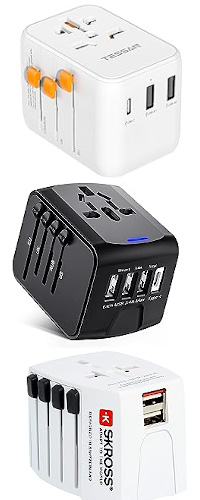
Bulgaria electrical outlets : do I need a travel adapter?
You're going to travel to Bulgaria and you don't know if your electric devices (your computer, mobile phone, battery charger...) will be able to work there?
To know if you need a travel plug adapter to go to Bulgaria, you have to consider 3 things : the shape of the plugs , the voltage and the frequency of the current delivered by electrical outlets in Bulgaria.
Electrical outlets (sockets) and plugs used in Bulgaria
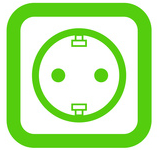
Plug adapter for Bulgaria
If none of your usual plug is compatible, you should buy a travel adapter to be able to plug your electric devices in Bulgaria ( please visit our selection on Amazon for more details ).
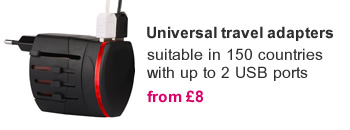
Prepare your travel to enjoy your stay in Bulgaria
What is the type of electrical outlets and current in bulgaria.
In Bulgaria, the type of electrical outlets commonly used is type F. These outlets have two round pins and are compatible with plugs that have two round pins or pins with a grounding connection.
The standard voltage in Bulgaria is 230 volts, and the current frequency is 50 Hz.
How can I charge the battery of my phone or computer in Bulgaria?
To charge the battery of your phone or computer in Bulgaria, you will need:
1. Charger: Carry the appropriate charger for your device. Make sure the charger supports the voltage and plug type commonly used in Bulgaria.
2. Power Adapters: Bulgaria uses the Type F power socket, which has two round pins. If your charger has a different plug type, you will need a power adapter to convert it to Type F.
3. Voltage Compatibility: Ensure that your charger supports the voltage used in Bulgaria, which is 230 volts at 50 Hz. Most modern chargers are compatible with different voltage ranges, but double-check the charger label to ensure compatibility or use a voltage converter if necessary.
4. Power Outlet: Locate an available power outlet in your accommodation or public spaces such as airports, cafes, or charging stations. Be mindful of choosing reliable and secure outlets.
5. Charging the Battery: Connect your charger to the power adapter if required, then insert the adapter into the Type F power socket. Plug the charger into your device and let it charge until the battery is full. Monitor the charging process to ensure everything is working correctly.
Remember to always follow safety precautions while charging your devices, and avoid leaving them unattended for long periods.
Which power adapter should I buy for Bulgaria?
If you are traveling to Bulgaria, you will need to know which power adapter to buy in order to charge your electronic devices.
In Bulgaria, the standard voltage is 230V and the frequency is 50Hz. The power plugs and sockets used in Bulgaria are of type F. This type of plug has two round pins and is compatible with plugs of type C and E.
Therefore, it is recommended to buy a power adapter that is compatible with type F plugs. This will ensure that you can easily plug in your devices and charge them without any issues while in Bulgaria.
What are the 20 largest cities in Bulgaria?
1. Sofia 2. Plovdiv 3. Varna 4. Burgas 5. Ruse 6. Stara Zagora 7. Pleven 8. Sliven 9. Dobrich 10. Shumen 11. Pernik 12. Haskovo 13. Yambol 14. Pazardzhik 15. Blagoevgrad 16. Veliko Tarnovo 17. Vidin 18. Montana 19. Razgrad 20. Gabrovo

- Royal Villas
- Green Life Villas
- Villa Sanaan
- Villa Gardenia
- Villa Magnolia
- Villa Amber
- Sunny Hills Villas (6 guests)
- Sunny Hills Villas (12 guests)
- Batak Studio
- Lazur Studio
- Central Studio #1
- Central Studio #2
- Central Studio #3
- Availability search

A password will be e-mailed to you
Reset Password

Plugs and sockets in Bulgaria

Those of you who have traveled a lot have most probably realized that each country has their very different electrical socket type. This information is quite important before your trip to the country since you can find a suitable adapter and come prepared.
How to use different plugs and sockets in Bulgaria
Proper access to electricity is crucial in today’s era since you need to charge not only your camera but your smartphone, tablet, smartwatch, smart bracelet, etc. This can turn out to be a problem if you find yourself stuck in a country with completely different electrical sockets, especially on arrival, when all of your devices need to be charged. There is an actual way of classifying different sockets. It is done by calling them with certain letters from the alphabet. They start from A and end up with N.
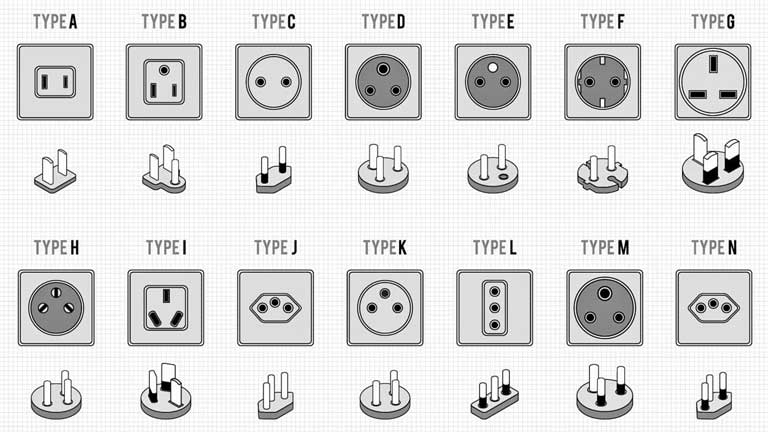
In Bulgaria, we use the plugs and sockets “C” and “F” types.
Type c – socket & plug.
The C plug is the most common plug across entire Europe. It is also known as the Europlug since from all of the EU countries only the UK, Malta, Ireland, and Cyprus use a different type. In Bulgaria, we not only use the “C” plug but we stick to the “C” socket as well. The “C” plug can be best described as a plug with two prongs that are each about 19mm in length.
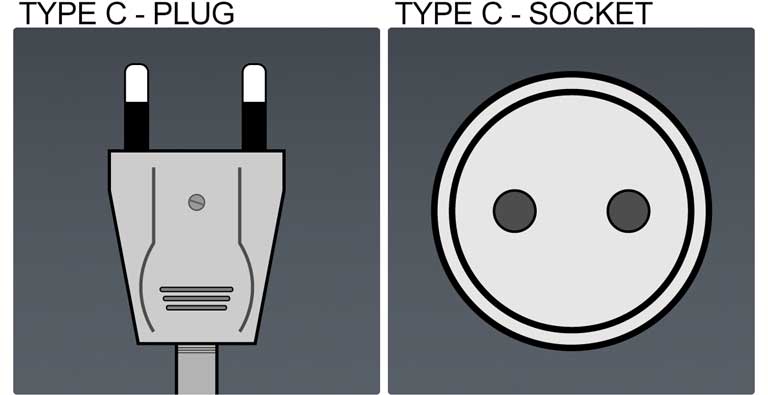
There is a growing tendency that the “C” sockets are being forbidden worldwide but here in Bulgaria we still use them almost everywhere. In case there is some socket different than the “C” one, it is most probably going to be the “F” one.
Type C socket will also works with plug E and F
Villas in Bulgaria
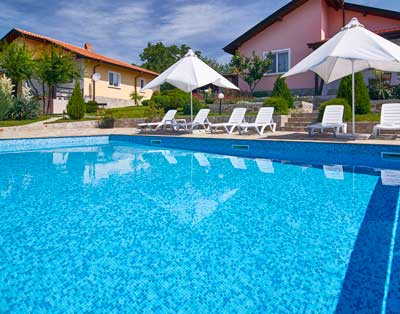
The other used socket type in Bulgaria is the “F” socket type
It is a common occurrence in countries such as Germany, Austria, the Netherlands, Sweden, Finland, Norway, Portugal, Spain and some of the Eastern European countries. This type of socket is similar to the “C” one except that it is round and has the addition of two grounding clips on the sides of the plug. The plug has two round pins, measuring 19 mm in length that are also 19mm away from each other.
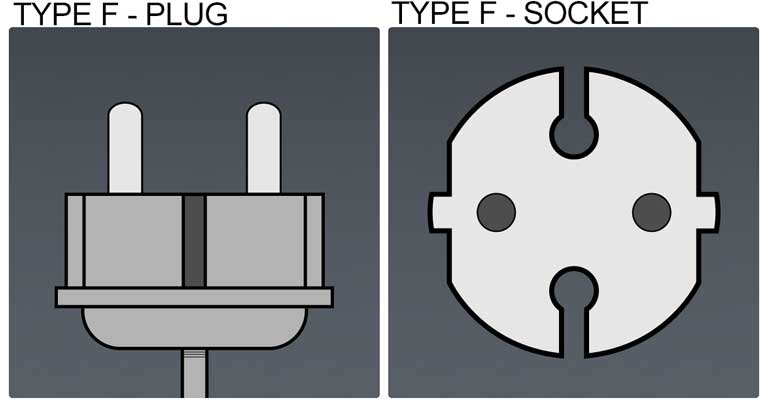
If you are planning a trip to Bulgaria, make sure you come prepared with plugs that match our socket types. If your devices come with a completely different plug the best thing to do is purchase a universal plug adaptor to different sockets with the use of different nozzles. It is the most efficient and convenient solution. We highly recommend that option since you will not worry about plugs and sockets no matter where you go. Naturally, you can also purchase an adaptor device of any sort in the country you are visiting, but it is better to come prepared. Sometimes it is harder to find the proper adaptation device, especially if you come from a country that uses some of the more uncommon types of plugs.
Type F socket will also works with plug C and E
Make sure to find a “C”, “E” or “F” plug adapters before coming to Bulgaria.
Electricity voltage and frequency in bulgaria.
In Bulgaria the standard voltage is 220 V and the frequency is 50 Hz. You can use your electric appliances in Bulgaria if the standard voltage in your country is in between 220 – 240 V (as is in the UK, Europe, Australia and most of Asia and Africa). Manufacturers take these small deviations into account. If the standard voltage in your country is in the range of 100 V – 127 V (as is in the US, Canada, and most South American countries), you need a voltage converter in Bulgaria. You can also consider a combined power plug adapter/voltage converter.
If the frequency in Bulgaria (50 Hz) differs from the one in your country, it is not advised to use your appliances. But if there is no voltage difference, you could (at your own risk) try to use the appliance for a short time. Be especially careful with moving, rotating and time related appliances like clocks, shavers, and electric fan heaters.
To be sure, check the label on the appliance. Some appliances never need a converter. If the label states ‘INPUT: 100-240V, 50/60 Hz’ the appliance can be used in all countries in the world. This is common for chargers of tablets/laptops, photo cameras, cell phones, toothbrushes, etc.
Sockets and plugs – Type G
This stype of socket is used in UK, Ireland, Cyprus, Malta. The Type G electrical plug has three rectangular blades in a triangular pattern and has an incorporated fuse. British sockets have shutters on the live and neutral contacts so that foreign objects can’t be introduced into them.
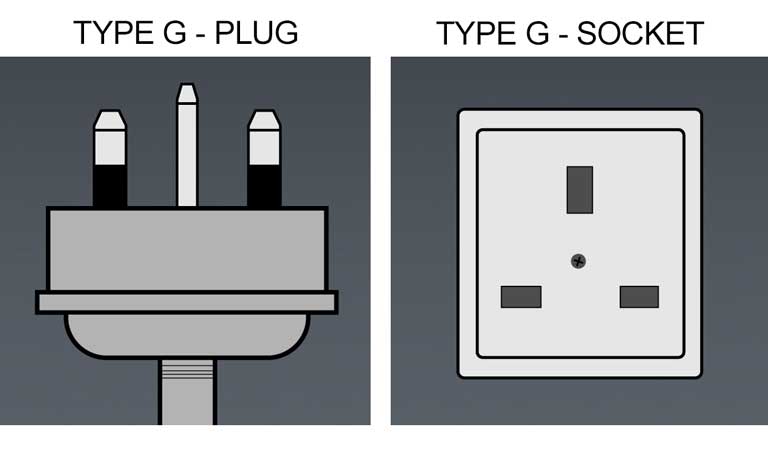
Visitors that come from the UK for a holiday in Bulgaria really have it the easiest. Since the type “G” plug is not as uncommon and it is actually quite easy to come across a good device that will connect you to the Bulgarian sockets. Some hotels and rental villas with pool even have their rooms equipped with such adaption devices.
Type G socket has no alternative plugs
Sockets and plugs – Type A & B
The “A” and “B” types of sockets, that are mainly used in the USA, Canada, Mexico, and Japan are also some of the easiest to find suitable adaptation for. It is important to note that the “B” type of socket is compatible with both the “A” and “B” plugs. So if you find an adaptation device with a “B” socket, you will also be able to plug any “A” devices in there as well.
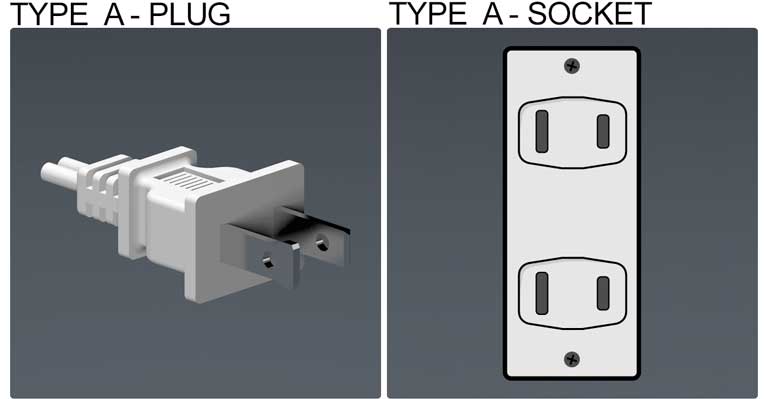
The Type A electrical plug (or flat blade attachment plug) is an ungrounded plug with two flat parallel pins. Although the American and Japanese plugs appear identical, the neutral pin on the American plug is wider than the live pin, whereas on the Japanese plug both pins are the same size. As a result, Japanese plugs can be used in the US but often not the other way around. The pins on Type A and Type B plugs have a hole near the tip that fits into ‘bumps’ found on the contact wipers of some sockets so that the pins are gripped more tightly allowing for better contact and also to prevent the plug from slipping out of the socket. Some sockets have spring-action blades that grip the sides of the pins, making the holes obsolete.
Type A socket has no alternative plugs

The Type B electrical plug has two flat parallel pins and a round grounding (or earth) pin. The earth pin is longer than the other two so that the device is grounded before the power is connected. As with the type A plugs, the American and Japanese versions vary slightly.
Type B socket also works with plug A
Other types of sockets and plugs in Europe
There are some more interesting socket and plug types across Europe . They are quite uncommon and there is actually a great chance that you won’t be able to find an adaptor for them in Bulgaria. So you really better come prepared in advance.
Type “J” that is commonly used in Switzerland and Lichtenstein is just one of them. Its unusual layout makes it one of the hardest to find an adaptor for.

The Type J plug has two round pins as well as a grounding pin. Although the Type J plug looks a lot like the Brazilian Type N plug it is incompatible with the Type N socket as the earth pin is further away from the centre line than on Type N. However, Type C plugs are perfectly compatible with Type J sockets.
Type J socket also works with plug C
Type “K” that is used in Denmark and Greenland is just as unusual and uncommon and we strongly advise our guests from those countries to find an adaptor or any solution before coming to Bulgaria.
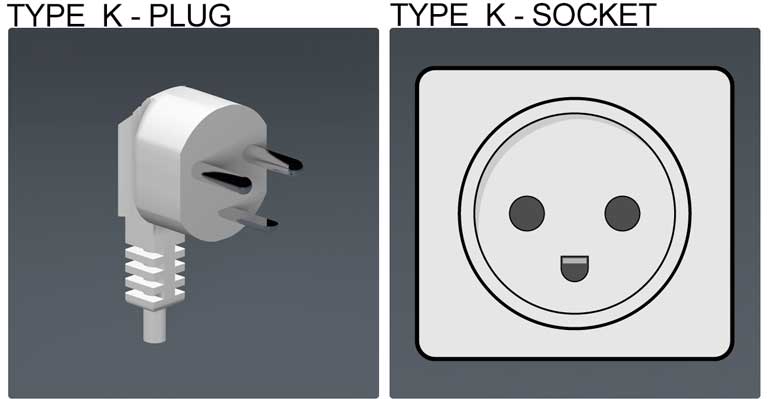
The Type K plug has two round pins as well as a grounding pin. It is similar to Type F, the difference being that Type F has grounding clips instead of a grounding pin. Type C plugs are perfectly compatible with Type F sockets. Type E plugs and sockets are also used in Denmark.
Type K socket also works with plug C, E and F
Type “L” is the plug type used in Italy and Chile. It has 3 pins that are situated horizontally one, next to another. It is advised that tourists from those countries also prepare in advance since finding a device to adapt to Bulgarian sockets may turn out to be quite daunting task. It is definitely not impossible but it can turn out to be quite hard.
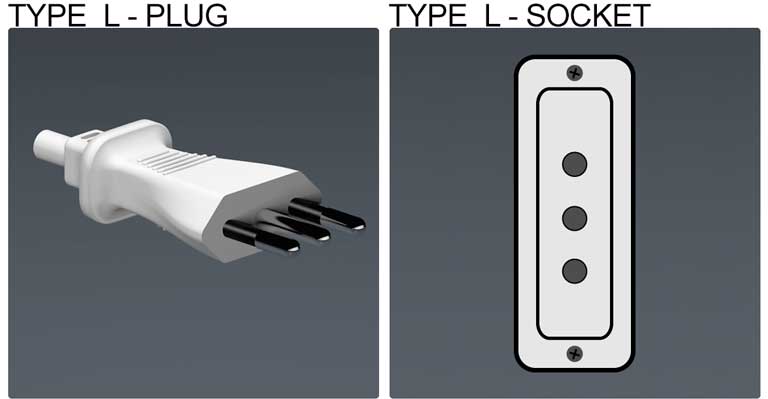
Italy has a kind of “universal” socket that comprises a “schuko” socket for C, E, F and L plugs and a “bipasso” socket for L and C plugs.
The “M” and “N” types that are used outside Europe are even harder to come across. So any future tourists from South Africa, Brazil, Thailand should really consider acquiring adaptation in advance.

The Type M plug has three round pins in a triangular pattern and looks similar to the Indian Type D plug, but its pins are much larger. Type M plugs are sometimes used for bigger appliances in countries that make use of Type D plugs, as well as in Israel (Type H). Therefore, sockets in these countries sometimes work with Type M plugs.
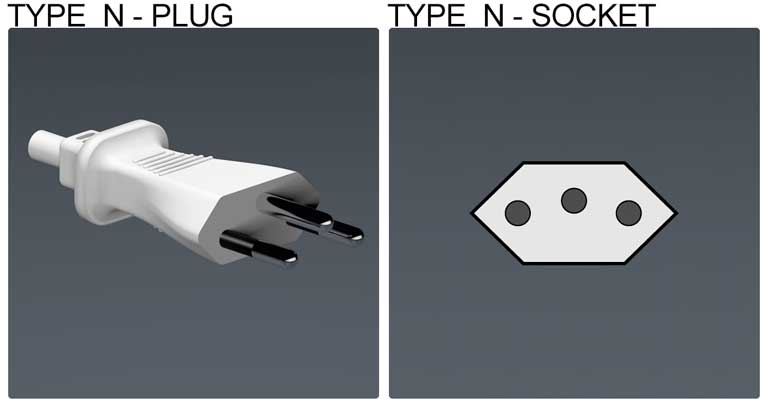
The Type N socket was designed to work with Type C plugs as well. Brazil is one of the few countries that uses two types of voltage. While most states use 127 V, some of them use 220 V. It is therefore important to find out the local voltage before plugging in your appliance
Type “I” that is often used in Australia, New Zealand, and China are easier to come across.
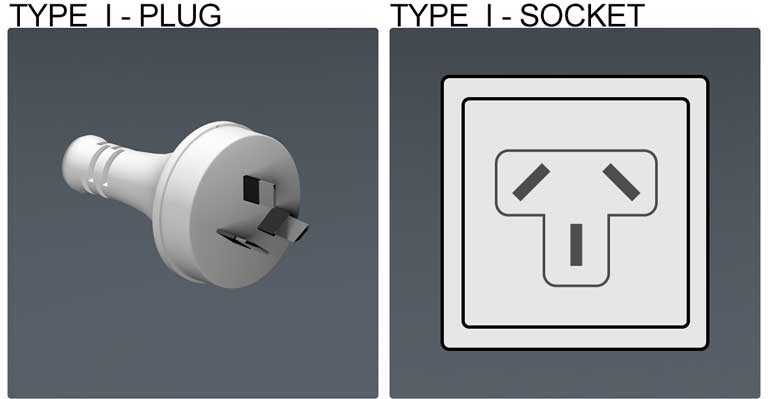
The Type I plug has two flat pins in a V-shape as well as a grounding pin. A version of the plug, which only has the two flat pins, exists as well. The Australian plug also works with sockets in China.
The most uncommon and unusual one, that you will find really hard an adaption device for, is the type “H” plugs . It is a plug that is used only in Israel. The chances to find a suitable adapter for an “H” plug are really small.

Type H socket also works with plug C. You can check here for more information about plugs and sockets
Just as anything else in Europe, there is a great diversification of the socket and plug types used among nations. It is quite important to check if your local plugs apply to the ones in the country you are about to visit, otherwise, you are in for a very unpleasant surprise.
Making a good research on the topic can save you a lot of problems on the very first day of your holiday and prepare you for any possible situation regarding your access to electricity.
Book your holiday villa in Bulgaria
Related articles.

Search site
Top properties for rent in burgas, bulgaria.
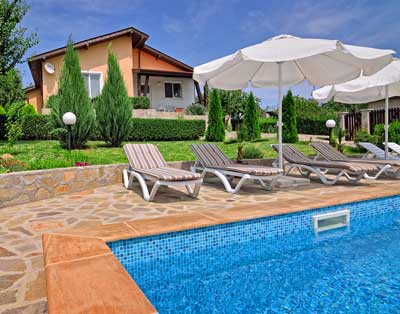
Posts from our blog

Song of Bryastovets

- Cell Phones & Accessories
- Accessories
- Chargers & Power Adapters
- Wall Chargers
Return this item for free
You can return this item for any reason: no shipping charges. The item must be returned in new and unused condition.
- Go to Your Orders to start the return
- Print the return shipping label

Image Unavailable

- To view this video download Flash Player
United States to Bulgaria Travel Power Adapter to Connect North American Electrical Plugs to Bulgarian Outlets for Cell Phones, Tablets, eReaders, and More (2-Pack, Black)

Purchase options and add-ons
About this item.
- TRAVEL FROM NORTH AMERICA TO BULGARIA EASIER with a TWO-PACK of quality plug adapters. Designed specifically to be an electrical outlet adapter for Bulgaria, you can charge and use your favorite devices during your trip!
- SUPERIOR CONSTRUCTION with reinforced prongs, sturdy fireproof ABS plastic, and copper components rated to 6 amps; don’t gamble with inferior and dangerous lookalikes
- COMPACT AND LIGHTWEIGHT, simple to use with no easily-broken moving parts or unnecessary pieces you don’t need
- USE WITH ALL YOUR PORTABLE ELECTRONIC DEVICES including phones and tablets, e-Book Readers, and nearly all modern dual-voltage electronic devices. Do not use with irons, hair dryers, lamps, or appliances
- LIFETIME WARRANTY: Have peace of mind knowing this adapter is assured to work in all modern BULGARIAN outlets. Travel smarter with power adapters made to be used in Bulgaria.
Additional Details

Similar item to consider

Buy it with

Customers also search

Compare with similar items
What's in the box, looking for specific info, product information, warranty & support, product description.
TSA Universal is a brand of Vericonic LLC, a USA based veteran owned business.
Customer reviews
Customer Reviews, including Product Star Ratings help customers to learn more about the product and decide whether it is the right product for them.
To calculate the overall star rating and percentage breakdown by star, we don’t use a simple average. Instead, our system considers things like how recent a review is and if the reviewer bought the item on Amazon. It also analyzed reviews to verify trustworthiness.
No customer reviews
- Amazon Newsletter
- About Amazon
- Accessibility
- Sustainability
- Press Center
- Investor Relations
- Amazon Devices
- Amazon Science
- Sell on Amazon
- Sell apps on Amazon
- Supply to Amazon
- Protect & Build Your Brand
- Become an Affiliate
- Become a Delivery Driver
- Start a Package Delivery Business
- Advertise Your Products
- Self-Publish with Us
- Become an Amazon Hub Partner
- › See More Ways to Make Money
- Amazon Visa
- Amazon Store Card
- Amazon Secured Card
- Amazon Business Card
- Shop with Points
- Credit Card Marketplace
- Reload Your Balance
- Amazon Currency Converter
- Your Account
- Your Orders
- Shipping Rates & Policies
- Amazon Prime
- Returns & Replacements
- Manage Your Content and Devices
- Recalls and Product Safety Alerts
- Conditions of Use
- Privacy Notice
- Consumer Health Data Privacy Disclosure
- Your Ads Privacy Choices
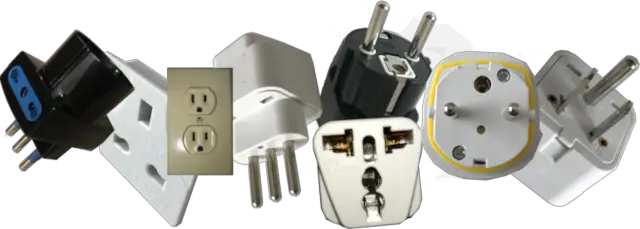
WhatPlug.info
Guide for the traveller with plugs
How to use plugs from United Kingdom in Bulgaria
Plugs, sockets, adapters and other information needed for travelling from United Kingdom to Bulgaria in this page. If you want a report for other countries, re-start the wizard to find to electric adapters for your trip here .
Quick Chart at-a-glance
If you are electrical savvy, perhaps the previous chart is all you need. If this is not the case, you can continue reading and discover what the chart is saying!
Plugs and Sockets at each country
In United Kingdom the following plugs are used: (includes London, Bath, Oxford, Cambridge, Brighton.)
Considerations for the United Kingdom
It is likely you will only find plugs-type "G" in the UK. Plugs type "D" and "M" are considered "old" and not common. They are are still used nowadays to differentiate low-power lighting circuits. So please don't try to use an adapter on them for high-power equipments like hair-dryer or even battery chargers. We keep "D" and "M" plugs in our database as we don't know your exact destination and you might find one next to a bed table. As a rule of thumb , you will probably be fine with the type "G" in hotels and big cities.
... and in Bulgaria you will use: (includes Sofia, Plovdiv, Varna, Veliko Târnovo, Burgas, Ruse, Sozopol.)
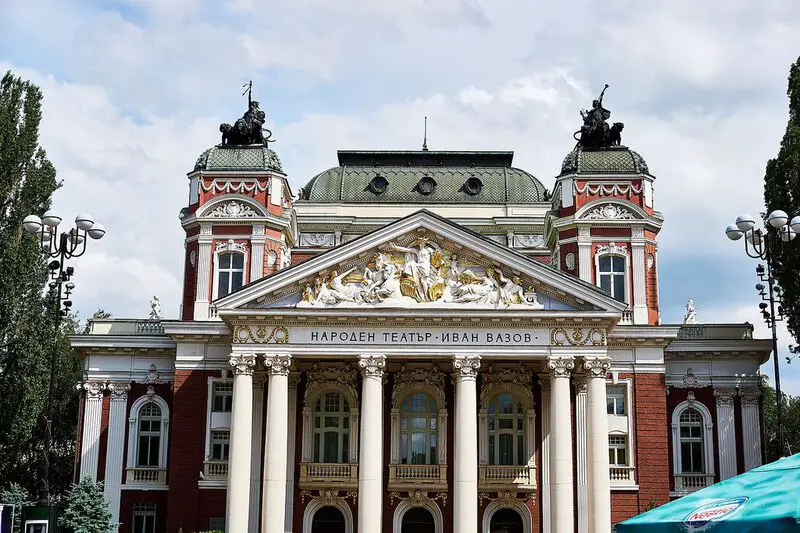
Sofia National Theater
We have a post " Plugs & Travel Adapters for your next trip to Europe ", maybe you want to read it.
Exact voltage
Perfect! This is very good! You will not need any sort of voltage adapter (they are always big, heavy and they can't handle too much energy. i.e. might have problems with hairdryers). You can plug your devices to the electric network grid in Bulgaria without requiring a voltage adapter.
Different plug systems
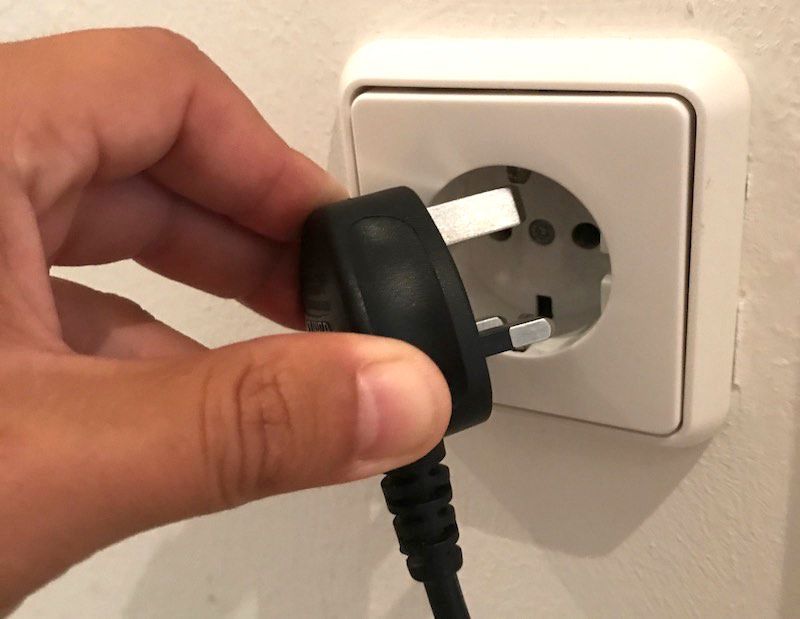
Sorry, none of the plugs used in both countries are common. You will definitelly need plug adapters, please continue reading for more information.
Lists of adapters you can use in your travel:
Adapter: generic
This adapter allows you to use plugs type: A, B, C, D, E, F, G, H, I, J, K, L, M, N into outlets type: E, F.
This adapter allows you to use plugs type: A, B, D, G, I, M into outlets type: C, E, F, L.
This adapter has a safety protection so you don't plug only one terminal into the adapter while touching the other with your finger, because it is generic, when you buy it pay attention to this safety mechanism. Overall a good adapter that has the earth connection pass-though (notice the metallic connector on the side.)
Adapters you can buy
You can buy the following multi-purpose adapters from Amazon. Please also take a look at the recommended gadgets for your trip.
Equal Hertz
This is the perfect situation. You will not have any clock shift issue with the same Hertz.
Please Select your Location
This will help us to show you adaptors that will work with your domestic devices.
Tip: If you are not located in the UK or USA just click on the picture that shows your domestic plug or socket / outlet type and we'll know what you need.
Alternatively if we do not support your specific plug / socket types yet you can close this and view the site with default settings.
You can change your preference at any time by clicking on the flag icons at the top of the page.
- 10220volts is the best place for your 110 220 Voltage Converter
- Shopping Cart

Overseas Best Buy Inc. 172 N Brandon Drive Glendale Heights, IL 60139
- 800 827 9978
- Need Help Free Consultation
No products in the cart.
Return to shop
- Accessories
- Code Free DVD Players
- Voltage Converters
- Order Status
- Customer Service
- Search for:

Bulgaria Power Plug Adapters Kit with Travel Carrying Pouch – BG
Bulgaria Plug Adapters Kit with Travel Carrying Pouch Includes:
- One Wonpro Grounded plug adapter for Bulgaria
- One Wonpro Non-Grounded plug adapter for Bulgaria
- One Basic Grounded plug adapter for Bulgaria (other outlet configuration if needed)
- One Basic Non-Grounded plug adapter for Bulgaria (other outlet configuration if needed)
- One Black Travel Velvet Carrying Pouch
$ 10.71 – $ 11.90 Quantity Discounts
SKU: Bulgaria-Plug-Adapter-Kit Categories: Adapters , Worldwide Travel Plug Adapter Kit with Carrying Pouch Tag: Bulgaria
- Description
- Additional information
information
Voltage and video.
- Bulgaria Electrical Outlet Type
- Bulgaria uses Type C and Type F

Bulgaria Voltage and Video Systems
Bulgaria Voltage and Frequency
- Electricity in Bulgaria is 230 Volts, alternating at 50 Hz (cycles per second)
- If you travel to Bulgaria with a device that does not accept 230 Volts at 50 Hertz, you will need a voltage converter
Bulgaria Video System
- Bulgaria has D.K/SECAM video system
Bulgaria History
110220volts Dismiss
Username or email address *
Password *
Remember me Log in
Lost your password?

Traveling internationally? These are the plugs you need
This post contains references to products from one or more of our advertisers. We may receive compensation when you click on links to those products. For an explanation of our Advertising Disclosure, visit this page .
- Traveling internationally? The only plug you really need for multi-country travel is a handy universal travel adapter .
- In addition to a universal adapter, I also bring a travel power strip .
- My wife likes to travel with a voltage converter like this , specifically for her hair styling tools.
My family and I are going on a big European trip this summer and I’m getting everything organized. I searched for one of my many international plug adapters but I couldn't find it. I usually have one in my carry-on bag because it’s great gadget to have even if you’re not going overseas. You may already know why if you read this story: Brilliant travel hack: Why you should Pack a European plug adapter even when you’re not traveling to Europe
If you haven't, I'll fill you in: It's because the power ports on planes can fit a variety of plug types and the U.S. ones tend to get worn down the most, probably because they’re used the most. But the European sockets are usually nice and tight and your plug won't fall out.
We’ve gone on two road trips to San Diego in the last couple of weeks so I took a bunch of stuff out of my bag that I knew I wouldn't need. But that’s always risky because that’s how things get lost or misplaced. I’m living proof.
Last summer, I wrote this piece, Traveling internationally? Here’s how to know what plugs and adapters you need , about a handy website that’s been around for ages !and used to be much easier to navigate than it is now!) It asks travelers where they are from and where are they going. Then it shows you exactly which plug you should bring. It's very handy if you're not sure which adapter you need, especially if you're going on a multi-country or multi-continent trip, in which case, I'd suggest getting something like the Apple World Travel Adapter Kit .
But you can avoid that hassle by just bringing the only plug you really need for international travel: a handy universal travel adapter . Although, if you’re just going to continental Europe (not the UK) then it’s easier and cheaper to just bring a small European plug like this .
I always carry a European plug in my bag but when I’m going to multiple countries, I take the bulkier international adapter. With all of the different plugs and chargers we're all using, it’s great to have one that also has a USB and USB C ports as well like this one .
In addition to a universal adapter, I also bring a travel power strip so I can just use a single plug to plug the strip into the wall and then use the power strip to plug all of my US plugs into. If you’re going on a cruise, be sure get one that is cruise approved; surge protectors are prohibited. You'll need something without surge protection, like this one . Otherwise, it will probably be confiscated until it’s time to disembark. One last quick tip: My wife likes to travel with a voltage converter like this , specifically for her hair styling tools.
KEEP READING
- Did you know your electronic devices should always be charged when going through security?
- The travel gadget flight attendants never leave home without
- Going on a cruise? Be sure to bring this
- The genius phone hack to try when your plane doesn’t have an in-flight entertainment system
- Travel hack: How to use your wireless headphones to watch in-flight movies
Want more travel news, tips and deals? Sign up to Johnny Jet’s free newsletter and check out these popular posts: The Travel Gadget Flight Attendants Never Leave Home Without and 12 Ways to Save Money on Baggage Fees . Follow Johnny Jet on MSN , Facebook, Instagram , Pinterest , and YouTube for all of my travel posts.


IMAGES
COMMENTS
Type C plug sockets are used in Europe, Africa and Asia. They have two round pins and no grounding pin. These plugs are typically used with devices that have a voltage of 220-240V. This outlet is rated for 2.5 amps. Plug Type E, and Type F are compatible with this socket. All other plug types will need an adapter.
In Bulgaria, power plugs and sockets (outlets) of type F are used. The standard voltage is 230 V at a frequency of 50 Hz. ... Buy a power plug (travel) adapter. We don't sell power plug adapters. We refer you to Amazon, where you will find a great selection of travel adapters. If you travel a lot, consider buying a world travel adapter that ...
The power sockets in Bulgaria are of type F. The standard voltage is 230 V at a frequency of 50 Hz. You need a power plug (travel) adapter in Bulgaria.
Here is a quick guide to help you figure out if you need a travel adapter for Bulgaria: What Power Plugs and Outlets Are Used in Bulgaria? In Bulgaria, there are two main types of power plugs and outlets: Type C and Type F. Type C: Type C plugs have two round prongs on either side of the plug, commonly known as Euro plugs. Mostly used in Europe ...
We've got all the info you need for your trip to Bulgaria. Do you need a travel adapter? Yes, you'll need a travel adapter in Bulgaria. Key takeways. 🔌 The outlets in Bulgaria are type C and F. ⚡️ The voltage is 230V and the frequency is 50Hz. 🌎 You do need a travel adapter for electrical devices from the United States.
Everything you need to know about your international travel plug adapter. When it comes to finding the right international travel plug adapter you can be spoilt for choice. There are USB travel adapters, voltage converters, differing plug types, wireless adapters, dual travel adapter/converters and even universal travel adapters.
Sofia National Theater. Blog . We have a post "Plugs & Travel Adapters for your next trip to Europe", maybe you want to read it.Voltage Take care: Bulgaria uses higher voltage than United States of America Your electric devices from United States of America will be expecting 120 Volts, but Bulgaria grid is of 230 Volts, this is a substantial difference that requires you to take some extra ...
Bulgaria travel adaptors. You will need to consider what to pack, to ensure you can use your personal electrical appliances safely whilst abroad. This normally includes the use of a ... For Bulgaria there are two associated plug types, types C and F. Plug type C is the plug which has two round pins and plug type F is the plug which has two ...
Small print on the device or power adapter indicates what voltages the device can work with. If you see 100-240V 50/60Hz printed, the adapter is rated to work on all voltages used worldwide. Please note that power plug adapters only convert plug types and do not convert voltages. Our recommended adapters
Universal Travel Adapter: This type of adapter usually includes multiple plug types, including each types of plugs, making it perfect when you are traveling internationally. Bulgaria's Adapters: These adapters are specifically designed for use in Bulgaria and also include surge protection to keep your devices safe.
What is the voltage and frequency in Bulgaria? The standard voltage in Bulgaria is 230 V, while the standard frequency is 50 Hz. For travelers from countries with a standard frequency between 220 - 240 V, such as Australia, Europe, the UK, and countries in Africa and some parts of Asia, electric appliances can be used in Bulgaria without a voltage converter.
Select your destination country for a detailed report of adapters, plugs and handling advise for electronics abroad. The Last Question . Where are you travelling to? Choose your country destination so we can tell all you need to know for your travel. Popular destinations from Bulgaria. People Republic of China; North Korea; Dominican Republic; Guam
The travel adapter in Bulgaria: The power adapter for Bulgaria is a small and cheap plastic adapter which permits a Bulgarian power outlet to Work with a different type of power plug from an appliance from another region. And the best power adapter for Bulgaria will be a Type F plug adapter which allows you to use any 230 volt appliance or device.
A recommended power adapter for Bulgaria will ensure that your plug then fits into the sockets in Bulgaria. We've used SK Ross devices around the world for more than 10 years now, and this power adapter has covered us in all the 110 countries, that we've traveled to, including Bulgaria .
Where to Buy Plugs and Adapters. Turning away from safety tips, finding plugs and adapters in Bulgaria may be an issue for travelers. Where to buy them is the first step. Bulgaria has a variety of shops that carry plugs and adapters, ranging from the local hardware store to electronics stores and more. The local hardware store is a great place ...
1. Charger: Carry the appropriate charger for your device. Make sure the charger supports the voltage and plug type commonly used in Bulgaria. 2. Power Adapters: Bulgaria uses the Type F power socket, which has two round pins. If your charger has a different plug type, you will need a power adapter to convert it to Type F. 3.
Type F socket will also works with plug C and E . Make sure to find a "C", "E" or "F" plug adapters before coming to Bulgaria. Electricity voltage and frequency in Bulgaria . In Bulgaria the standard voltage is 220 V and the frequency is 50 Hz.
United States to Bulgaria Travel Power Adapter to Connect North American Electrical Plugs to Bulgarian Outlets for Cell Phones, Tablets, eReaders, and More (2-Pack, Black) Brand: TSA Universal 4.0 4.0 out of 5 stars 1 rating
Sofia National Theater. Blog . We have a post "Plugs & Travel Adapters for your next trip to Europe", maybe you want to read it.Voltage Exact voltage. Perfect! This is very good! You will not need any sort of voltage adapter (they are always big, heavy and they can't handle too much energy. i.e. might have problems with hairdryers).
Best US to Bulgaria Travel Adapters 2024 - You will need a type C/F plug adapter. In stock and available from $. #8226 Local outlet type: F & #8226 voltage: 230 V & #8226 frequency: 50 Hz. ... Travel Plug Adapter for Bulgaria The electrical outlets used in Bulgaria are type F. You will therefore need a US to type C/F adapter in order to plug in ...
Bulgaria is located in Europe and uses the same adapter plugs as most other countries in Continental Europe. The United Kingdom uses a separate adapter plug. The Going In Style Deluxe Bulgaria Adapter Plug Kit comes with two adapter plugs (grounded and non-grounded) and ships Priority mail. Adapter plugs allow electrical connections up to 240 ...
Best UK to Bulgaria Travel Adaptors 2024 - You will need a type C/F plug adaptor. In stock and available from £. #8226 Local socket type: F & #8226 voltage: 230 V & #8226 frequency: 50 Hz.
Bulgaria Power Plug Adapters Kit with Travel Carrying Pouch - BG quantity. Add to cart. Quantity Price ; 1 - 2 $ 11.78: 1% Off: 3 - 10 $ 11.42: 4% Off: 11 - 50 $ 10.95: 8% Off: 51 - 10000 $ 10.71: 10% Off: SKU: Bulgaria-Plug-Adapter-Kit Categories: Adapters, Worldwide Travel Plug Adapter Kit with Carrying Pouch Tag: Bulgaria.
In addition to a universal adapter, I also bring a travel power strip so I can just use a single plug to plug the strip into the wall and then use the power strip to plug all of my US plugs into ...